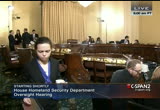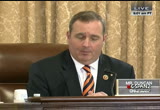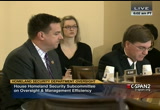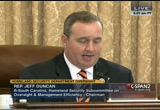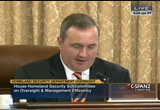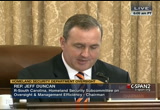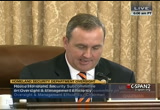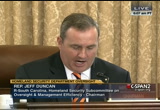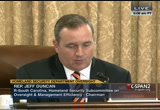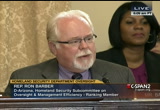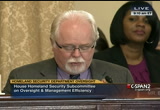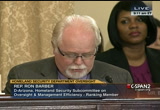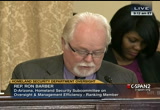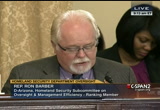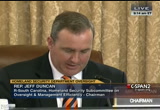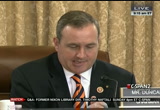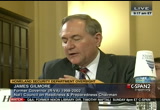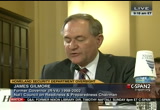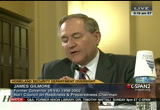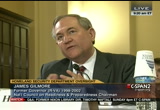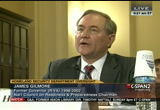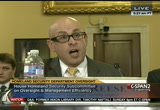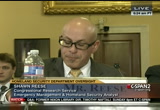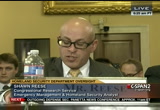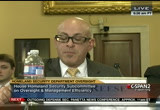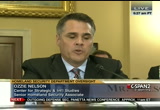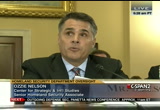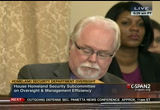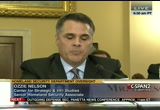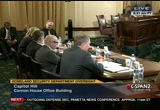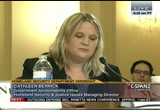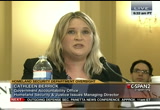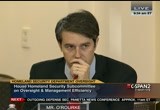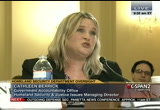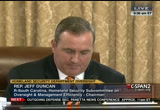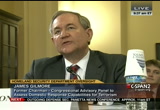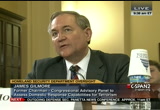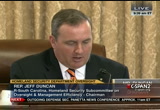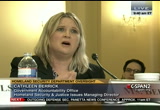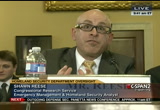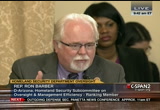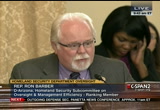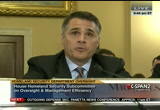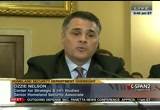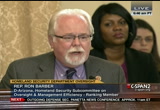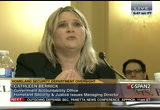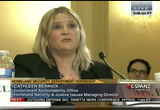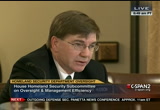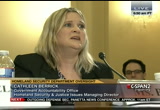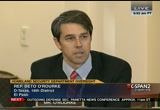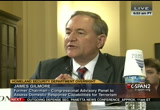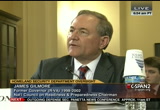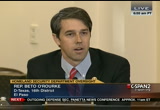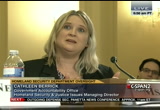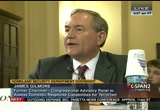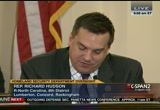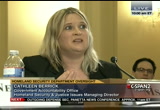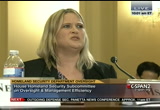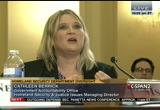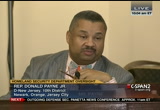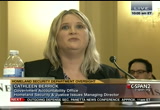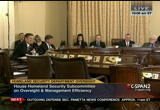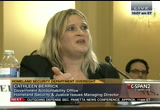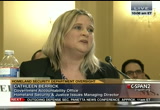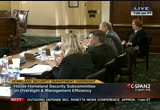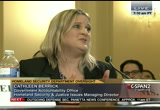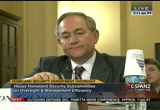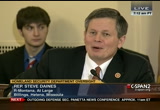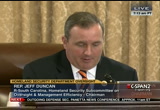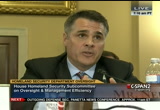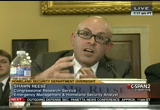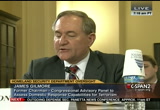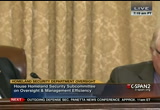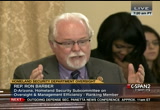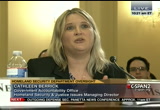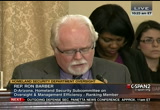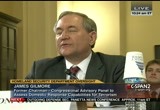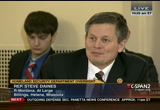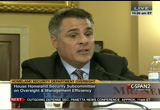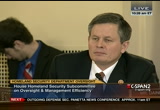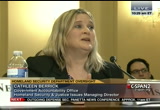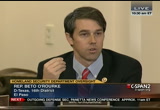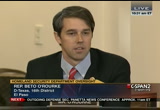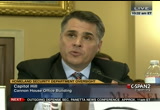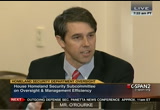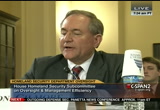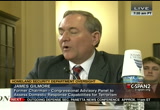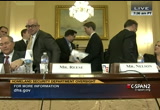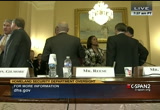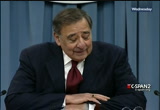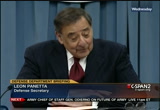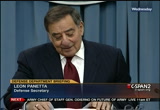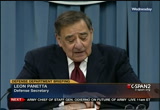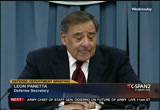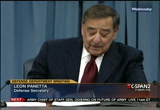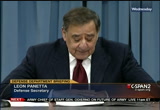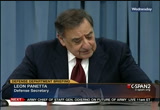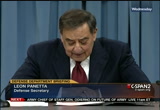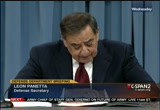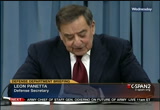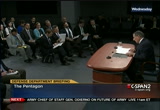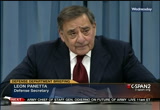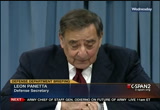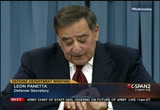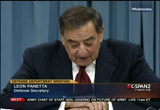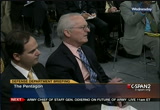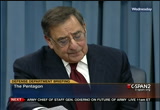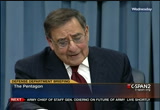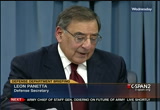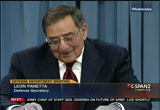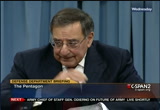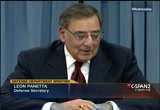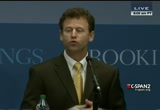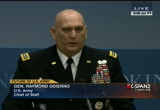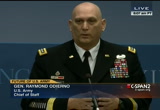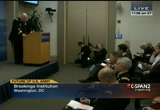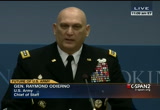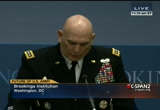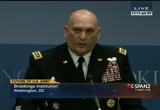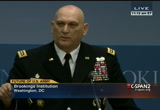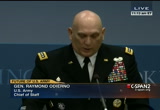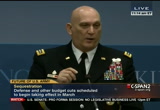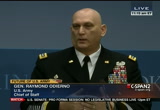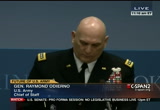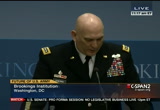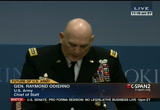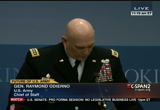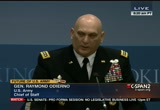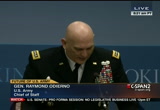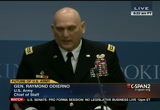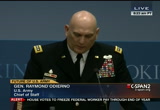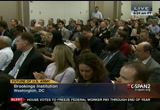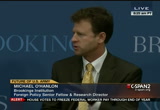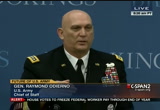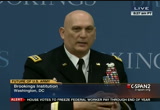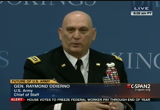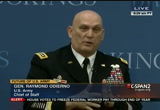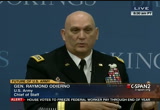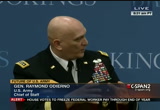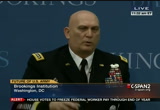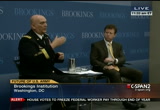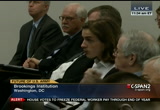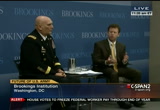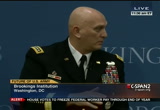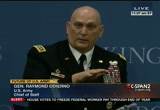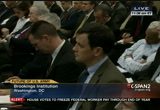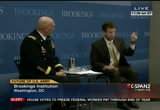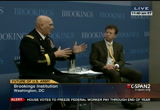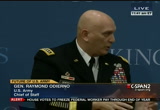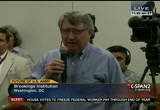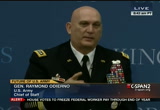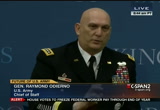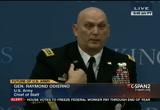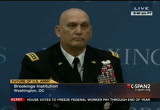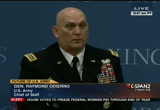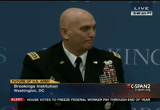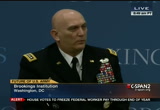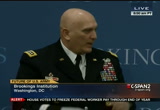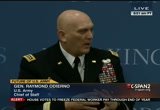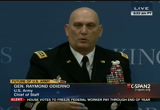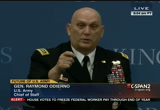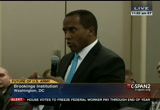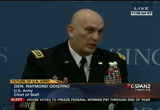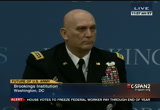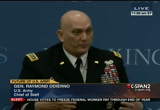tv U.S. Senate CSPAN February 15, 2013 9:00am-12:00pm EST
9:00 am
women on the street. >> this presidents' day, c-span premieres its new series, first ladies, influence in image from a historic decatur house in in washington, d.c. with historian, chief of staff, social secretaries, exploring the lives of the women who served as first lady. from martha washington to michelle obama, and a first of its kind project for television. see someone begins monday night at nine eastern and pacific on c-span, c-span radio and c-span.org. watch the program earlier in the daylight at 2 p.m. eastern on c-span. >> the house home and to give subcommittee on oversight this morning is examining the performance of homeland security department over the 10 years since the 9/11 attack. witnesses include an official from the government accountability office which listed several areas under dhs control in his most recent high-risk list. the report highlights government programs and agencies that may be vulnerable to fraud, waste, abuse and mismanagement or are
9:01 am
most in need of brought before. this hearing should get underway in just a moment. live coverage here on c-span2. [inaudible conversations] >> the committee on homeland security subcommittee on oversight and management officials will come to order. the purpose of this hearing is to examine the efficiency of the department of homeland security and how wisely their spending taxpayer dollars. let me begin by extending a warm welcome to other members of the subcommittee. i'm looking forward to working
9:02 am
with the ranking member ron barber as we both share a strong commitment to u.s. border security and ensuring our border agents receive the support that they need to protect the homeland. last september, ron and i attended the dedication ceremony of the bryant a kerry border patrol station in arizona on wrangled patrol agent brian terry who was killed in december 2010 in the line of duty in arizona. also look forward to a strong bipartisan cooperation in helping to make the department of homeland security as efficient and effective as possible. i would also like to introduce our new freshman majority members. today we have mr. kief rothfuss from pennsylvania and mr. richard hudson of north carolina, and later joining us will be mr. steven gaines of montana. they bring a wealth of experience to their new roles in the congress and on the subcommittee at a look forward to leveraging their experience and knowledge to provide effective oversight of dhs. let me pause for just a minute
9:03 am
and think the subcommittee staff who have worked diligently to put this first hearing together and preparing the members of the committee. so thank you for the. i know recognize myself for an opening statement. next month marks 10 years since the creation of the dhs through homeland security act of 2002. the terrorist attacks of september 11, 2001, force us to fundamentally rethink the threats our nation faces and our approach to defending the homeland. as the 9/11 commission report documents, before 9/11 no executive department had as its first priority the job of defending america from domestic attack. that change with the creation of the department of homeland security. dhs was established to one, prevent terrorist attacks within the united states, too, reduce america's own abilities to terrorism, and three, help america recover from any attacks that may occur.
9:04 am
and dhs, however, is facing a massive challenge of creating a new organization by integrating 22 separate federal agencies and proponents into a unified department. it's important to always remember the gravity of the issues dhs faced in its inception and how those experiences affect the department's current responsibilities to protect critical infrastructure, develop countermeasures against chemical, biological, radiological and nuclear threats, secure our borders and transportation systems and manage the federal government's response to terrorist attacks and major disasters. today, we seek to assess how widely dhs is spinning american taxpayer dollars. hasn't been successful in beating its mandate established by the homeland security act of 2002? we know that there have been 54 publicly known at 10 to terrorist attacks on the u.s. that have been thwarted since 9/11. however, ended in such as the 2009 at that on fort hood that killed 13 americans, more than
9:05 am
2009 christmas day underwear bomber, and the 2010 attempted car bombing in times square reminds us to remain ever vigilant. but our full terrorist attacks a good measure of dhs success, or are the other criteria the american people should use to evaluate the dhs? today, many americans question have dhs uses the resources entrusted to us. in 2004, dhs had a budget of $39 billion. now it has a budget of almost 60 billion, and employs more than two under 25,000 people and operates in over 75 countries and is the nation's third largest federal agency. congressional watchdogs have issued thousands of records with ways to improve efficiency of the dhs and save taxpayer dollars. the government accountability office expose billions of dollars in cost overruns that major dhs acquisition programs have incurred. as we learned yesterday, dhs remains on gao high-risk list in
9:06 am
several areas, including the departments management. in addition the dhs inspector general has identified over 1 billion in questionable costs. dhs, however, has yet to double that these cost savings opportunities. in november 2012, the inspector general also identified significant challenges in how the department protects the homeland and manages its operations. the report noted difficulties for tsa in securing our airports, for cbp and identifying proper travelers entering in a state ever been in determine whether to declare federal disasters despite spending $4.3 billion in response efforts annually. the ig also stated that much more work remains for dhs to efficiently manage its finances, consolidate old legacy databases to efficient data systems, and approve acquisition outcomes. other examples of unacceptable waste by dhs have also been revealed. for example, a recent
9:07 am
congressional investigation found that tsa has over 3500 administrative staff in headquarters with an average salary over $100,000. these figures don't include the number of tsa screeners across the country which ballooned to almost 48,000 in 2011, resulting in tsa spending over 3 billion, half its budget, a year in payroll compensation and benefits. according to press reports, dhs generally doled out $61 million in salary awards in 2011 despite the hard economic times and reduced take-home pay for many hard-working americans. since its inception, dhs has also spent more than 35 million homeland security grants. a recent senate report documents have dhs prioritizes its grant funding with dhs employees using grant funds to pay a thousand dollar fee for a conference at the paradise point resort and spa where they participated in zombie apocalypse training. other examples exist of dhs spending money on children's map
9:08 am
of overpriced long for the training materials and even bagpipes for the customs and border protection. now, while dhs has taken steps to improve its day-to-day management, i believe the american people still deserve better. we are over $16 trillion in debt. hard-working families that had to make difficult budget decisions, dhs must do the same. that the numerous examples of dhs programs with cost overruns, schedule delays and performance problems cannot continue in this constrained budget in china. we must opened your dhs becomes a better steward of taxpayer dollars. this 10 year anniversary of the creation of dhs presents the subcommittee with an opportunity to reflect on what has worked, what has not worked, and where dhs needs to improve. recommendations by today's witnesses will help us better understand the issues that dhs faces, and identify ways to help dhs improved. and i look forward to the testimony. the chair when i recognize the
9:09 am
ranking minority member of the subcommittee, the gentleman from arizona, mr. barbour, for any statement he may have. >> thank you, mr. chairman. it's a pleasure to be here this morning, and welcome to witnesses and members of the subcommittee. i'm looking forward to working with the chairman any productive and bipartisan manner as we conduct oversight of the department. it is apparent to me already having met the chairman and spoken with him at length that we see eye to eye on many issues related to the efficiency and effectiveness of the department. and i appreciate his courtesy and collaboration with me as we move this important agenda forward. this is our first subcommittee many of the 113th congress, and i cannot think of a better issue to examine the manner in which the department spends hard earned taxpayer money. the department of homeland security has one of the largest budgets in the federal
9:10 am
government. each year approximately $40 billion in appropriate funds flow in and out of the department. among other things, these funds are used to pay over 220,000 employees, secure our aviation system, provide disaster aid to states and local, and purchase equipment used by those protecting our ports. we owe it to the taxpayers to ensure that these funds are a programmer years, fully accounted for, and spent wisely. unfortunately, over the ten-year history that has not always been the case of the department of homeland security. my congressional desert in southern arizona includes over 80 miles of u.s.-mexico border, and my constituents along the border are particularly affected by criminal act in ways along the border with nearly 40% of all drug apprehensions occurring in the tucson sector. this is unacceptable. we must do better. the department must do better.
9:11 am
i am reminded as i think about safety along the border of two deaths that occurred within the last two and a half years. the chairman mentioned that we attended a dedication ceremony at the station in the south was order for brian terry, a border patrol agent who was killed in the line of duty. i am also reminded of the death of rob krentz, a ranch, fourth generation rancher was killed on his own land by a cartel member. the safety of our citizens and the safety of the men and women who protect our border is paramount. the department must respond and must use the money wisely to do so. as the representative, and one of only 10 members of congress that represent a district that shares a border with mexico, i'm committed to ensuring that we improve border security, particularly along the southwest border. as i visit with ranchers, border patrol agents, local law enforcement agents in my
9:12 am
district, i have seen firsthand how the department uses taxpayer dollars to secure the border, and i know we can do better and we can do more. in 2006, the department of homeland security announced its plan to install technology along the southwest border that would serve as a virtual fence and provide a border patrol with information it needs to secure the border. unbelievably, the contract that allowed the project to go forward did so specifically prohibiting border patrol agents, those who work on the ground, from providing input to the design, develop, implementation of that system. that's unacceptable. seven years and over $1 billion later we're still without the plan that was originally envisioned, and subsequent, the arizona border surveillance technology program remains in question. according to the gao, the department does not have the information necessary to support and implement the estimated
9:13 am
$1.5 billion plan which is the successor to the council -- counseled multibillion-dollar sbinet. in addition to find the department hasn't yet damaged the effectiveness and suitability of its new approach for deploying surveillance technology, the gao also found that $1.5 billion, ten-year cost as for for the program, may not be reliable. if this new plan goes awry, the department will spend over $2 billion in an attempt to develop force secure technology with little more to show than canceled programs and canceled checks, via contractors. this is one example of why the department must fix its broken acquisition system. to improve how it does its job cost analysis and to make sure that we have a better way of purchasing and deploying technology. to its credit the new administration has made some improvement. the newly created office of programmability and risk management designed to manage data oversight of the programs appears to be a step in the
9:14 am
right direction. i am concerned, however, that on 45 staff in this office responsible for over $18 billion. making best use of scarce taxpayer dollars and doing all it can to protect men and women who live, americans live longer border, across our country, is the first responsibly of the department and the primary responsibility of this committee. i look forward to today's hearing and testimony, and a continued oversight of this important topic. i yield back. thank you, mr. chairman. >> thank you, ranking member. other members of the subcommittee are reminded that opening statements may be submitted for the record. we are pleased to have a very distinguished panel of witnesses before us today on this topic. the honorable jim gilmore as a former governor of virginia and chairman of the congressional advisory panel to assess domestic response capabilities for terrorism involving weapons of mass destruction. prior to serving the commonwealth of virginia, as
9:15 am
governor from 1998-2002, governor gilmore was virginia's attorney general. he also served the united states army as a counterintelligence agent. thank you for that service. in 2009, governor gilmer became president and ceo of the free congress foundation. mr. shawn reese as an expert on homeland security policy at the congressional research service. he has written numerous reports to congress on federals, state, local homeland security policy issues. he has testified before the house government reform and oversight committee on homeland security advisory system, the house homeland security committee on federal counterterrorism training programs. prior to coming to crs, mr. vries was an officer in a states army for 10 years. thank you for your service, sir. mr. ozzie nelson, caresses as a senior associate in the homeland security counterterrorism program at the center for strategic and international studies. mr. nelson joined csis in september 2009 after retiring
9:16 am
from the united states navy. thank you for your service, ma sir. in 2005 he was selected to serve as an inaugural member in a national counterterrorism center's directorate of strategic operational planning. boy, that's a mouthful. prior to his assignment in nctc, mr. nelson serve as an associate director for maritime security in the office of combating terrorism on the national security council. ms. cathleen berrick is the managing director of homeland security and justice issues at the government accountability office. in this position she oversees gao's reviews of department of homeland security and department of justice programs and operations are prior to being named managing director buck comptroller general gene dodaro, she oversaw gao's reviews of aviation and surface transportation sturdy matters, as well as the department of homeland security's management issues. prior to joining gao, ms. berrick held numerous positions at the department of
9:17 am
defense and the u.s. postal service. thank you all for being here today. and the chair will now start by recognizing governor gilmore to testify. >> congressman, thank you very much. mr. chairman, mr. ranking member barber, members of the committee, thank you for the invitation to address this important issue 10 years on after 9/11, the 9/11 attack. the pre--- free congress at the center for national instant to address many of the big picture is for strategic issues but not the least of which is homeland security issues. as the chairman said i chair the national congressional advisory panel on homeland security. for three years before the 9/11 attack and for two years thereafter. while i was the governor of virginia, i was doing that work at the beginning. 10 years on we are in a position to do so assessment, the colleaguecollegewere here with e certainly experts in this field. i would like to address very quickly some of the strategic
9:18 am
issues for just a moment. the fundamental question i think for the committee, the subcommittee and the full committee is, do you really have a strategic plan to safeguard the nation? and is homeland security structure to really carry out that? how can you really a suspect effectiveness of the department of homeland security unless you examine their mission and strategic plan and whether or not their success with it. you can focus of course on customs and border immigration tsa, coast guard, office of preparedness and expenditure of the money in order to carry out these missions. but we did not initially recommend the office, because it doesn't include the department of defense, cia, the fbi, most importantly local and state officials. the question really before the committee is, as the strategic plan included enough to be able to really secure the homeland? i pointed to issues. al qaeda has said in a public
9:19 am
statement that the goal is to collapse the economy of the united states. that's what i have said. and i think that the committee has to remember that within the context that if we waste money or carry out an ineffective program, that draws too much money unnecessarily, they we're actually turning out the mission of al qaeda. that's why this committee's work is so important. and cycling i want to point to the issue of drug traffic on our southern border. precisive as the ranking member did. this is a serious danger to the united states and remain so and is growing. the cartels are extremely vicious. they threaten members of the constituency, not only in the southern border but across the united states. the young people who are really becoming addicted, and this is not a voluntary matter because it involuntary, are being destroyed, young people's lives are being destroyed, and the nation is being weakened by this kind of issue. so the border issues and issues of cooperation with allies, with our law enforcement people is most critical.
9:20 am
let me focus in the last minute, two minutes on the real concern that i have. and that is the issue of the civil liberties and civil freedoms of the people of the united states. the real danger here is that there will be another attack. in fact, it is almost likely that there will be another attack. it's in the hands of our adversaries. if such an attack results in either panic, hysteria or insecurity in the minds of the people in the united states, there is danger of overreaction. not only of the public but specifically out of the congress of the united states. i point out that the patriot act was passed in 26 days after 9/11. with that serious full consideration, because there was a political made by the members of the congress to get reelected and to get those votes and show real activity. this can happen again. i'm not condemning the patriot act but i am concerned about the mindset that could occur if there's another attack and we
9:21 am
are not appropriately prepared. so i would suggest to the members of the committee, the goal that we should see and homeland security is more public discussion to the people of the united states about the nature of the true threat, whether or not there's a real danger, with the potential preparedness is of the department of homeland security and the nation as a whole, how local people should be cut in and participate, whether or not we're prepared to respond to that kind of attack, and this kind of leadership opportunity is very significant. it's a big opportunity for the department of homeland security. but the department is quiet in terms of its actual discussion with the american people. that confidence and calm is will be necessary i in the time of te crisis to make sure that we don't restrict the liberties of the american people in exchange for security. the goal of the united states has to be to have a response,
9:22 am
plan in place, well understood, that not only secures this nation, but also simultaneously and without mitigation secures the civil liberties of the american people at the same time. thank you, mr. chairman. >> thank you, governor, for that fine testimony, and that you will not recognize mr. reese. >> chairman duncan, ranking member barber, members of the subcommittee, on behalf of the congressional research service i would like to thank you for the opportunity to appear before the subcommittee and to discuss homeland security. crs was asked specifically to discuss homeland security definitions and missions, and a multiple definitions within should teach it documents affect the funding and risk-based, prioritization of these. many observers agree that a clear privatization of national homeland security missions is needed. and it consists of steps necessary to prioritize missions ranging, for example, from
9:23 am
border security and counterterrorism, disaster assistance. my written statement addresses these issues in detail, and discusses the absence of both the standard homeland security definition and a single national homeland security strategy. along with potential issues related to these matters. i will now briefly discuss these issues. presently, homeland security is not funded using clearly defined national risk-based priority. arguably, these parodies need to be set and need to be clear in order for funding to be most effective. in august 2007, congress enacted implement the 9/11 commission recommendations act. which require dhs secretary to conduct a quadrennial review of homeland security. this review was to be a comprehensive examination of the nation's homeland security strategy, including recommendations regarding the long-term strategy and the nation's priorities, and
9:24 am
guidance from the programs assets, capabilities, budgets, policies and authorities of the department. later, critics argued that the original 2010 burden of the review did not meet these requirements. currently dhs is developing the 2014 quadrennial review. now might be an ideal time to review the concept of homeland security. its definition and how the concept and definition affects congressional appropriation and the identification priority. however, more than 10 years after the 9/11 terrorist attack in the policymakers continue to grapple with the definition and concept of homeland security. today, the are numerous specific strategies such as an actual strategy for global supply chain security, international response framework. however, today there is no single comprehensive national homeland security strategy. the concept of homeland security as he falls. one may even argue that it might
9:25 am
be waning on a separate comprehensive policy concept. evidence for this viewpoint can be found in the current administration incorporation of homeland security staff into the national security. and the inclusion of homeland security guidance in the 2010 national security strategy, there has not been a distinct national homeland security strategy since 2007. additionally, the office of management and budget has questioned the value of required federal departments and agencies to identify homeland security funding in their fy 2014 budget request submission. three options stand up to address these issues. first, congress could require a distinct national homeland security strategy which would be similar to the bush administration's 2007 and -- 2002 and 2006 strategy.
9:26 am
second, congress could require a refinement of the national security strategy that could include sustained risk-based homeland security priority. finally, congress made strictly focus on dhs activity. this option would entail dhs or the refining its quadrennial review which it presently is doing. in closing, multiple and competing definitions and -- excuse me. may hamper congressional authorization, appropriation, oversight options. it may also restrict dhs and other federal entities ability to prioritize and execute homeland security mission. failure to prioritize and execute homeland security missions based on risk may result in unintended consequences. i will conclude my testimony here, and once again, thank you for the privilege to appear before you. >> thanks so much, mr. reese. the chair will now recognize mr. nelson to testify.
9:27 am
>> good morning, chairman duncan, ranking member barber, and distinguished members of the subcommittee. thing for the opportunity to testify today. i want to know while still a fully with csis i am now a vice president at cross match technologies but i would like to take this time to discuss how the department of homeland security, congress and american people to work together to support dhs's continued evolution to risk based security model. following 9/11 we created the department of homeland security and gave it a mandate to protect all people from all things all the time. with this mandate became relatively federal budgets. but times have changed and in order for dhs to continue to protect the homeland during a period of limited budgets, we as a nation must accept the basic but by the fact that we cannot guarantee and cannot afford to provide absence of duty. instead we must protect the nation through risk-based security but this requires identifying with the greatest restore security our, and allocating limited resources against those risks. dhs is moving in this direction
9:28 am
but it must be accelerated and then so with can't appear in the past would not have the political will to ever that such models given the to carry with it an inherent degree of risk. yet still survive the current fiscal climate as a forces the hurdles presented us an opportunity. my remarks will focus on tiki areas where i believe further efficiency can be made to my written testimony includes a broader range of ideas and depth of analysis. first, dhs must -- a risk-based model security is inherently driven by information intelligence which enables policymakers and analysts to make a full decision whether risk is highest. this begins with dhs's network of fusion centers which become all the more valuable as the department transitions towards this model. fusion center serve as a primary point, front door if you wish, of interaction within the federal government and state and local centers and the private sector. the current architecture and number of fusion centers may not
9:29 am
be fully optimized, it will continue to play a vital role in information sharing and must not be offended at such a dhs must accept to ensure the controversy over how these does not threaten their utility. the department must accept the state of local entities will only be willing to continue to participate in fusion centers if they add value beyond counterterrorism and most work to strike a balance between counterterrorism at all hazards mission. the second issue i want to discuss the screening and preventiocredentialing could dhs and credentials millions every day seeking to gain access to everything from air travel to computer systems. an effective and efficient means is vital to risk-based security approach and allows dhs to allocate its resources against those who potentially pose the greatest threat. however, responsibility is currently spread across multiple agencies within dhs to this model is inefficient and as demand rises and budgets follow become untenable. but the departments service is
9:30 am
-- integration of all databases should be accelerated, programs like tsa's precheck and see bps global entry to continue to be expanded to include a greater number of travelers for a brightsource. further such trusted travelers should be provide an id number that will recognize a cross programs greater increasing operability. dhs could not only save limited budget don't but secretary napolitano recently stated goal of having 50% of travelers and road and the trusted code program within two years. fiscal should be embraced and supported by congress. in conclusion, into every space security model would not be without its challenges. it will require congress, teaches an american people engage in ongoing dialogue about our priority. the level risk we're willing to accept. it is important to emphasize understand the mother how well
9:31 am
executed, in adoption of a risk-based model will inherently me soon some degree of respect and implement them we must be willing to accept not only the risk of potential consequence. we cannot simply provide complete protection if and when it is an attack. furthermore, some areas with the increase resources others may receive little or nothing. if we as a nation willing to accept these facts for a risk-based model for homeland security of the potential to help reorient us go to mars threats even when budgets are tight and. thank you again for the opportunity to testify. >> thank you so much. for that testimony. the chair when i recognize this. to testify. >> good morning, chairman duncan, ranking member barber and members of the subcommittee a place to be here to discuss dhs's ongoing efforts to build a unified department and position itself of the future. when dhs began operations 10 years ago, gao recognize that creating such a large and complex department would take years to achieve.
9:32 am
since that time we've conducted an extensive body of work at the department, issuing over 1300 products and making over 1800 recommendations to strengthen the programs and operations. our work has collectively shown the department has made significant progress across its mission. however, it's important note that dhs is still maturing, more work remains, and there is several crosscutting gains that have affected their efforts thus far that need to be addressed moving forward. in terms of progress, dhs has developed strategic operational plans, trained workforces, establish new offices and programs, and issued policies and regulations to govern its operation. however, more work remains. many of dhs's problems have come with a significant price tag. for example, we reported that dhs needs better information and coordination to prevent unnecessary duplication among four overlapping large grant
9:33 am
programs that together account for over 20 billion in grants awarded from 2002-2011. another example as was mentioned by representative barber this morning, dhs experience schedule delays and performance shortfalls with its secure border initiative program resulting in its ultimate cancellation. dhs has also taken action to address a small percentage of individuals who have overstayed their visas. we reported at dhs could also reduce the cost of the federal government related to major disaster declarations by updating the principal indicator on which assistance decisions are based to better reflect the capability, the states could ability to respond to that disaster. about 25% fewer disasters and may have been funded by the federal government between 2004-2011. of the specific rates for these and other challenges there, we identify three common themes based on the work that offended
9:34 am
the departments progress and should be addressed moving forward. first, dhs has made important strides in strengthening their management functions such as acquisition and i.t., in recent years. however, significant challenges remain imposed serious risk. for example, dhs has, continue to cost more than expected, take longer to deploy than planned, and deliver less capability than promise. we reported in september that 42 out of 70 major programs we reviewed at dhs experienced cost growth and schedule slippage is, or both. 16 of these programs accounted for 32 billion in cost overruns over a three-year period, just 16 of those programs. they need to strengthen dhs is management functions is on gao's high risk of is for this reason. second, dhs has made important strides in providing leadership and coordinate efforts for stakeholders but needs to take
9:35 am
additional action to strengthen partnership initiative and utilization of terrorism and law enforcement information. gao also designated information sharing as high risk throughout the federal government including dhs, and his but our are high risk lessons 2005 at finally limitation strategic program planning and limited assessments to inform approaches and investors have handed the departments efforts. dhs has also made progress in analyzing risks across sectors, but they've made less progress in actually incorporate that information into its planning and budgeting decision process. given dhs a significant leadership role in homeland security, it's critical that is programs or operates efficiently and effectively as possible. continue to mature. nearly come in summer, nearly 10 years after dhs's creation, they have indeed made significant progress but have yet to reach their full potential.
9:36 am
thank you think of the opportunity to testify. i look forward to questions. >> thank you so much. thank the witnesses for excellent testimony, and providing your comments beforehand. the chair when i recognize himself for questions. 10 years, a tremendous opportunity for us to stop and look back at the effectiveness of the department. oversight to ensure that taxpayer dollars are spent effectively is an important part, and important role of congress. the protection of civil liberties is, in my opinion, just as important. with the passage of nba a in the fear of indefinite detention among the american people, the talk of drone use ordinary states territories and executive orders on cyber terrorism do concern americans about their
9:37 am
civil liberties and privacy. so governor gilmore, your panel made the issue of civil liberties a cornerstone at the commission. are you satisfied that the department is evaluating each initiative and program in terms of how well they preserve our unalienable rights to make sure that they are not crossing the line? >> no, congressman, i'm not. as i said i in my opening remar, my principal concern remains that without a thorough discussion of the nature of the threat and the arrogance of the united states will respond to it, there it is and if i were, a political environment that could, in fact, i in danger and threaten the civil freedoms of the united states, if all of a sudden the american people demand a response that congress feels it must respond and civil liberties could be the first thing that goes overboard. you mentioned the national defense authorization act. i think it's a very legitimate concern. one of the principal focu focusf
9:38 am
our advisory panel, principle focuses was whether or not and how you use the military in the homeland. if you create a panic or a stress environment in the united states, there is a danger that the executive branch will simply respond and use whatever resources are available to it without regard to law or restrictions such as -- which, of course, we know a doctrine that prohibits the use of military and homeland. it was one of the five principal focuses of our advisory panel, our concern over this type of environment. the ndaa, the national defense authorization act in fact in our view does begin to move the military into a domestic responsibility and into a domestic function. this is not good. and that's why the focus of our panel was to focus on local and state responders as well as federal law enforcement so that
9:39 am
nonmilitary people are infected doing what's necessary to protect the homeland. so once again, as i close with this answer, congressman, i'm concerned about exactly the issue that you point out. >> thank you for the. i shoul share the concern is wie and just recently general assembly in my home state passed legislation to push back against ndaa, and so we are watching it very closely. on wednesday, the full committee hearing looking at a new perspective on the threats of the homeland. the honorable david walker, foundethefounder and ceo of thek america initiative spoke about of appointed by chief operating officer for the department of homeland security. we met yesterday, he and i come india lab ready that this position should have a specific qualification requirement, a term of five to seven years in a performance contract and be considered at level two. i realize that the department has done something so to that
9:40 am
with its chief management official. ms. berrick, from a management angle, how effective do you think this type of model is for helping dhs improve in his leadership and implementation capabilities? >> thank you, mr. chairman. i think i can be effective, and that's a suggestion that gao me early in the department creation. having that central authority and over visible and continuity over the operation of the department. however, i also think dhs current structure with the undersecretary for management can be effective, if that individual is given the authority and resources to implement their position effectively. now, recently a few month ago dhs actually issued a directive that strengthens the undersecretary for management authority among the various dhs components. and we think that's a very positive step in the right direction. in summary, i think both models can work. i think dhs is structured, can
9:41 am
achieve that same end, begin at the undersecretary for management is given to support an authority that he or she needs. >> okay. thanks for that. mr. reese, just a final follow-up on that. you talked about congress directing dhs initiatives through budgeting and other things. you think congress should have more day to day, and i say day-to-day, but more hands-on input on how the money should be spent, directing dhs in certain areas of? >> as you know we are for -- we are a congressional research service. i do have an opinion that there is not, congress could be involved through legislation possibly, requiring dhs to identify either through mission focus and risk-based priorities, specifically within the department, or congress could look at crosscutting and getting the whole of government to discuss and prioritize mission.
9:42 am
and that is one way that would affect funding appropriation. >> thank you. and the chair will not recognize mr. barbour for his questioning. >> thank you, mr. chairman. you know, as a think about how we spent our should spend public money i think we should spend it like all of us do in our own household, with care. but one more piece, public money is spent, it has to be extra accountable and that's an issue that i want to get to this morning. you know, i understand that we have made progress. 10 years where we are better than when we started public improve even more so in the years ahead. it's no small task. i acknowledge that the secretary has taken on one of the most important and challenging tasks in the federal government trying to bring to 20 agencies and put together an effective working organization. a long time ago i participated in the formation of an agency that brought together eight
9:43 am
state agencies because in 1974. it's still a work in progress. we can't afford to let that be a continued issue or the department of homeland security. so i want to ask a question, mr. knows, if you could respond to this. according to the partnership for public service, the department is ranked 19th out of 19 among federal large agencies on over all employee satisfaction. i heard directly as i meet with senator back home from our border patrol agent, particularly in the tucson sector about examples of the problems with management and management priorities. for example, we've had six sector chiefs in six years in the tucson sector. we've had concerns raised by the people who are on the ground, the men and women who protect our country, the border patrol agents paying attention to priority to making with the most basic needs, for example, i've been told that currently
9:44 am
employees or agents are unable to purchase uniforms. additionally, i understand that our agents assigned to fort operating bases along the border have been charged with 2424 hour staffing for of the week at a time with no overtime or rest. so my question, what impact you think these policies and the dissatisfaction amongst our border patrol agents has on our security and effectiveness of the administration of department functions? functions? and what you believe the department can do to improve the leadership and management of the workforce? >> thank you, mr. ranking member for the question. dhs in my opinion in washington, d.c. is probably one of the most difficult places to work for a variety of reasons. one is the mandate we placed on congress to wake up every morning and again protect our people from all things all the time. they have zero margin for error. additionally no other department i would argue and acts with the american people in such a
9:45 am
personal level on a daily basis as this dhs which makes the job again extraordinarily difficult. it's only as listed 10 years into this. we didn't have participant 11th we can have a dhs workforce waiting to come into action after this christian the we had agencies operate independent but we didn't have a unified department. what makes this dynamic over the last 10 years is we've taken a poll. but deeply the department has made significant strides in trying to great homeland security personnel contrary to tended those individuals come to have career paths for them, to do the best they can to meet their needs and demands. we have to have a homeland security workforce where individuals are working in the department are for me with a disease and people that work at agencies awesomely with the departments but again, the greater challenge for dhs as it did not just an internal issue. have to do this at the state of local governments and also to do this for the private sector. to bring the workforce is such a broad mandate it's going to take him as going to take some
9:46 am
significant investment. >> i remain concerned, i think we all should, that employee morale is at such a low-level but i understand the difficult to bring together 22 agencies, silos, but want to preserve their individual authority. but we must do better, tucker for those men and women who every day put on the uniform, go into record territory to protect our homeland, and really i think deserve better. and ask if i could quickly, ms. berrick, about another issue. along with ranking member of the homeland security committee, thompson, i recently requested a jill review of the border border patrol street you plan. gao report came out about a month ago. we had public meetings on in arizona. what was really disappointing to me was that the results of that study showed that the department rolls out its strategic plan, it's risk-based to cheat you think of it had no goals, no mattress, no evaluation
9:47 am
processes. as the department has accepted gao recommendation by november of this year, to implement them, in your view what you need step should be taken to bring that about, and second, who should be at the table? who should be asked about what to be the goals, what should be the risk management measurements and evaluation process before those changes are aspects of the plan are implement its? >> thank you. a couple of things. yeah, it's critically important as a dhs and lets a strategic plan that they put in place to last year, the recent goals and measures are important because it's really a dhs is going to define security at the border, what ultimately are they shooting for in terms of ensuring security along the southwest border? and along with that do they have the resources that they need to do that and what's the appropriate mix of resources? as you know, dhs used to have a measure for border security called operational control that
9:48 am
they stop using since 2011. but what that measure basically said was how well are we doing coming, protecting the border, stopping the illegal traffic coming through the border and illegal goods coming over. dhs stopped using that measure and now they are just looking at apprehension which isn't as sophisticated a measure, doesn't give a great picture of security. and there in the process of reviving that to come up with a better measure, but it's going on two years now. that really needs to get resolved, and then coupled with that they need to determine what the appropriate mix of resources to achieve that goal. in terms of who they should bring out the table, they need to bring all the relevant stakeholders. you know, i think they should have agents that are on the ground that are dealing with this day in and day out. the stakeholders along the border, the other federal agencies that play a role in this. as you mentioned, and as i
9:49 am
mentioned in my opening statement, the need for dhs to really forge effective partnerships and bring stakeholders in on key decisions is really critical. homeland security is an enterprise. it's not just dhs. and so to be successful they're going to have to bring the stakeholders in and get their input. >> the gentleman's time has expired. now recognize the gentleman from pennsylvania. >> thank you, mr. chairman. i think your panelists for the work you've done everything your testimony today. just looking at a 10 year history of dhs and how we brought together the disparate agencies, have any of you given any consideration as to whether perhaps some of these agencies should be reorganized themselves? would there be any merit to taking a look at ice and cbp, putting them together? when looking at, wondering about is whether there might be a
9:50 am
structure at the agency that frankly could help morale? any of you. consideration of reorganization of the office within the agency that would promote more unanimity speaker speak on behalf of gaothis period what do we do at each is, i think that they could have been organized in a number of different ways. the decision was made to create and integrate these 22 components. they are 10 years into the. i think dhs can be successful, as organized, but there's some crosscutting issues that are going to need to address but one is the manager of the department because it has a direct ability, trick impact on the ability of government commissions. there's other crosscutting issues that they need to address, planning, risk assessment. so if you know and perhaps this is more of a question as their
9:51 am
first been created, but i think today looking at where they are, they can be successful, have structure but they're going to need to address these issues in order to be. >> [inaudible] >> isn't that not to speak with congressman, if i could, respond to very quickly. you were concerned about morale because of the identity of the department. the department came together as a whole group of already existing agencies, things as disparate as order patrol, coast guard and all this. so they all have their own identities. and all of a sudden they are being asked to take on new identities. now we are 10 years into this, and ms. berrick report isn't all that optimistic about the way it's being managed. we asked the advisory panel focus our issue on the nation and think that the committee should do that. the question is, is the mission being performed successfully?
9:52 am
and if it's not, is that because we impact of these disparate organizations and can they be reorganized and a better way? the real challenge that ic can you spend so much time and money trying to integrate managerially, that maybe the mission could be lost. >> thank you. yield back, mr. chairman. >> the gentleman yield back. the chair will recognize the gentleman from texas for questions. >> thank you, mr. chairman. governor gilmore, you mentioned that one of the aims al qaeda has been pursuing attacks against the united states is to destroy our economy. i represent much of el paso, texas. we have five ports of entry. two of which passed $80 billion in trade annually, about 20% of all u.s.-mexico trade. and right now we have bridgeway funds for cargo that lasts up to nine hours but and it's becoming more cost effective for some of
9:53 am
the shippers to air freight cargo out of that location rather than cross a to those ports of entry. with the potential for sequestered, and the possibility that we may need to further or even cut physicians when we are already understaffed at those ports of entry, can you or any of the other panelists address what that might do to our economy and how we might better prioritize those crossings? and i'll remind everyone that more than 69 jobs in this country are depending on the cross-border trade. >> it's a remarkable question about how one harmonizes the economic power of the united states, the challenge we're seeing worldwide to that power by threatening the economy, and economic challenges that we're seeing are deliberately and she tediously the goal of a group of
9:54 am
adversaries that want to undo that. so i think that the nation that you're discussing is a good one to lay on the table. which is how do we continue to have the commerce while at the same time we'd deal with this problem of the ingestion of illegal drugs, illegal individuals, of illegal, even arms and human trafficking. these are serious dangers on the southern danger and i laid in my opening remark that this needs to be a key mission to i think it's a legitimate question. have we become -- not confuse, but have we become so focused on the managerial question about how we do with morale, about how we deal with the integration of all these disparate organizations that we are not able to achieve the mission, which is to secure the economic, strengthen and fightingest is but i think it's a legitimate inquiry. >> and one of the issues that you also touched on in your testimony that you just mentioned again so much of the
9:55 am
focus at our ports of entry aren't legitimate crossings, and the length of border in between those crossings is on interdicting drugs here and i don't want to minimize the dangers that those drugs pose to our communities and most vulnerable within them, especially our children, but we have 60 state that already approved medicinal use of marijuana. two states officially legalized it. it's clear that the direction whicinwhich this country is mov, regardless of how they -- regardless of how we feel about it, and with it being said, one report i read shows 95% of the border patrols resources as they are connected to pursuing this war and drugs are focused on marijuana. did any of you have any recommendations about how congress can better respond to this and prioritize our resources to focus on those threats that are think we can all agree are a lot more
9:56 am
existential in nature, al qaeda, terrorists, human smuggling? those things that are true evils that we want to stop and prevent from entering this country. >> thank you. i do want to make a comment related to how to go about to do that, and i want to kind of move back to the comment i made about the management department. the reason management is so critical because it enables dhs, it gives them the ability to do things that you talk about, to implement their mission. and facilitate commerce while balancing that with security, i'll give you an example teach us with solving a program to detect shielded nuclear material in vehicles and empty tennis coming to our ports but this was a critical mission the department identified and they need to fill this program to the problem wasn't they were were developing, they working stakeholders involved on what the requirements were.
9:57 am
they want managing it with a rigor that any two bit and as a result they ended up with a program that didn't come a system that didn't fit within primary. so that was a management issue that had a direct effect on dhs ability to secure our borders. so it's critical, and i think, you know, in making this tough decisions about balancing security with the flow of commerce, management is really central to that. >> i know that time is almost expire but if i may give a direct answer to the congressman. congressman, there will be no aid and comfort from it with respect to the legalization of any kind of drug in the united states to as a former prosecutor and attorney general, i think what is overlooked is the involuntary nature of the use of drugs. we think it's a libertarian idea, it was to be able to with what you and all it can be. the truth is people are doing what they really should do or ought to do a want to do. they are doing what they're being compelled to you. particularly with respect to narcotics but i think is a
9:58 am
danger to the united states that needs to be focused on and would have to have a more honest conversation with. >> and people about. >> thank you. >> the gentleman's time has expired. the chair will recognize the gentleman from north carolina, the chairman of the transportation subcommittee, mr. hutton, for questions. >> thank you, mr. chairman. and thank you to the witnesses for being here today. governor come it's always a pleasure to be with you. appreciate your comments about the legalization of drugs. my question today though is toward directed to ms. berrick. the gao does an excellent job annually reporting on federal programs, agencies and offices, initiatives which have duplicative goals and activities and is issued key reports presented opportunities to reduce potential government, duplication, achieve cost savings, health agencies become more effective. what has gao identified as key areas of overlap and fragmentation in the government
9:59 am
accountability office activity? >> yes. gao is issued a report and you on duplication of overlap and fragmentation across the federal government. we've issued a first to report. we will be issuing a third in a position. related to dhs we identified seven key areas of duplication overlap and fragmentation, and the billions of dollars that we believe the department should address. some of this will require congressional action. i'll give you a couple of examples. one i mentioned in my opening statement, which is the coordination of grant programs that are multiple grant programs at dhs that have overlapping, they're going to overlapping individuals, for overlapping purposes. and so, and that may be okay, but the department needs to have this ability over the grants are going. if an entity is getting multiple grants, that was by design, not by accident. ..
10:00 am
the indicator is $1.35. that figure was created in 1986 there wasn't a whole lot of analysis that went behind it and it wasn't an adjusted for inflation every year since. had the indicator been adjusted to reflect increases in per capita income within the states, 44% of disasters declared over the last nine year period perhaps wouldn't have been funded by the federal government. had that factor been adjusted for inflation alone, the
10:01 am
percentage comes down to 25%. so i think the fiscal environment with reduced budgets of the department is going to have to face with the entire federal government is facing. they are going to need to look for opportunities to streamline operations to be more cost-effective and be more rigorous in how they make the allocation decisions. >> i think that is true across the spectrum but particularly in this case. what actions have you seen the department of homeland security that they have already taken where they've been successful in giving some of the streamlining? >> the dhs did those efforts for opportunity for cost savings but they tend to focus on operational issues the way they were managing resources more in turmoil within the department. we think the need to look more broadly in some of these tough issues and they are working on it.
10:02 am
the dhs did submit a proposal to streamline the grant programs and i know they have been discussed and considered but our view is they need to look at the higher ticket items like the grants, federal disaster. we've highlighted in the past and in the reports other opportunities the funds of the screening systems at airports to take up 90% of that and therefore spics' up 10% and identify that tsa made a recommendation that should go back and look at the cost share. is that appropriate given that the airports are getting some benefits out of the systems and getting faster which benefits them so we think those are the types of things dhs should put more emphasis on. they were actually tracking them in the entire federal government efforts to implement the overlap
10:03 am
report and will continue to track and report on their progress and address those issues. >> i appreciate the good work you do. mr. chairman, on the yield back. >> the chair will recognize mr. payne from new jersey. >> thank you mr. chairman i would like to think the witness for being here today to eight is there a way we can coordinate our technology and communication at the ports so that we can ensure the process is made more efficient and ensure security? >> the dhs has a mandate to screen the containers coming into the united states before they arrive in the united states but they've had difficulty addressing that. that is the massive problem they've created in the program in the secure border street
10:04 am
initiative where they are deploying personnel to try to ensure the containers coming into the united states they have to get agreements with the host country. there's a big price tag associated with it so they are in the early stages. what the gao has said is given the challenges we do on this, the dhs is to implement a risk-based approach what are the highest risk containers and new allies the programs to target the resources where they can provide the benefit because they can't secure everything and they have to make some trade-offs. ischemic a very important issue for my district having to put the point of elizabeth let me ask you also you have private
10:05 am
contractors more costly even though federalized employees much of the time do the same job and are paid less. would you agree that this needs to reduce morale and we should move towards federalizing fees' employees versus the contractors? >> the gao looked at the contractors in the department of homeland security. a few years ago that dhs couldn't even identify how many contractors they had. there was a massive number within the department. what we think is important for them to do right now is to determine the appropriateness of the contractor personnel now that they've done a lot of work to identify what they have to think through what is an inherent governmental function that should be performed by government employees verses contractors? so that this step number one.
10:06 am
then obviously with that, they should consider the cost, what can be done more efficiently with contractors versus federal employees that they need to know how many they have and think about what is inherently governmental that could be kept within the house. >> i would think that bringing them in a house they would be able to control the cost more effectively with them and not even knowing how many contractors are involved. thank you and all i yield back. >> now the chair will recognize the gentleman from the country in montana. >> thank you mr. chairman. i noticed some of my peers represent the district states that actually share borders. this might be for ms. berrick.
10:07 am
i'm appreciative of the federal testimony this morning. it's refreshing. have you looked at ways that we can spend less money and get more on the border security looking at the finding as a huge topic is a topic that in washington becomes front and center to border security. can you show us the ways we can get a better value the way we manage the border security? >> i think the first thing they can do is to use a lot of the good risk information that they generated and really build that into their decision making. recognize they are not going to be about to secure everything 100% of the time so what are the riskiest things they should be devoting their resources to? i think that's important. i think the second thing that is important is when they decide that they need to implement a program to ensure security of the border with airports or
10:08 am
elsewhere really putting the writer and the discipline for exactly what the right alternative is and then once we make a decision will do we go about procuring? often times we found that dhs hasn't done a great job looking at the alternatives waiting out the pros and cons and putting a discipline into the process that they need to verses rushing with one solution that may not be the best alternative. of course we recognize dhs has to work quickly. sometimes they may not have the luxury to do what i'm suggesting but looking at the department over all, we think there have been a number of missed opportunities because they haven't really done that planning ultimately would have benefited from them and they want to feel sometimes they are not successful or it takes years longer to get them out than they
10:09 am
had hoped. >> when i look at the state of montana has an at large member, my district is my state, and montana is a state that in one corner you can place washington, d.c.. the other corner you can place chicago and of that is the entire state of montana and we share a border with canada that is over 600 miles long. perhaps to turn the attention on the northern border and the vulnerabilities there. are we putting an emphasis on the securing the border we talk a lot about the southern border and rightfully so. we realize we live in the environment but some comments on the northern border and the fault of devotees we put enough effort there. >> i think that more work is required on the northern border. i mentioned earlier that cbp used to have a measure called operational control of the border and they did that both on the southwest border and the northern border. the southwest border in 2011 they were singing the had
10:10 am
operational controls about 40% of the border to the on the northern border that is much lower. it is less than 10% of the time. it is a difficult order to secure. it has unique challenges. we think one thing that dhs can do is leverage partnerships along the border and create task forces, try to employ the risk based decision making and this is going to be part of implementing their strategic plan. cbp issued this plan last year to identify the framework how they are securing to secure the southwest and the northern border but they haven't made a lot of progress and really moving forward with about plan putting some meat what is that going to mean for the resources? so the northern border will be a critical aspect they will have to think freely as they moved through with that plan. >> if i could add something, the northern border is vast compared to the southwestern border.
10:11 am
i spoke recently in canada, and the canadians are the most loyal allies and friends, and by the way, our biggest commercial partners in the united states of america but sometimes they feel like the united states neglects them in terms of the respective cooperation and i think those are diplomatic issues we have to continue to focus on. i would answer by saying that we need to spend more time thinking about intelligence sharing and making sure that the fbi, canadian officials, local law enforcement people along the border are sharing information appropriately to recognize the risks and the danger otherwise you end up patroling thousands of miles of the area that it's impossible to do. as you know,,, many of the towns are literally divided by the border. >> may i ask that? >> the last two years there's been significant progress between the dhs and the
10:12 am
government beyond the border action plan. in fact the implementation update recently canada was down here briefing that and there was a series of pilot programs and the coast of discipline programs and efforts for the domain awareness inside of the great lakes and it's been one of the strains of the department has done and the goal is to have free trade so canada has made a commitment they are going to phone some of these programs to kind of ressa reciprocate on this end so we have seen over the last two years. thank you. >> i would just offer i look forward to engaging the resources. would be the citizens and the local law enforcement that could work together in patrolling these miles on the northern border. >> time is expired, but we do have time for a second round of questioning if the members would like to do that. and if the witnesses can endure.
10:13 am
i would like to thank you the governor for mentioning the cooperation with the neighbors and i passed a bill signed by the president in the threat in the western hemisphere a big portion of that is looking at how we are working on the neighbors and the westminster that includes canada but also the southern neighbors as well to forward any sort of threat to the homeland and that is a valuable thing. my question is coming from the private sector what i see out of the government is a lot of times they do not operate efficiently like we have to operate in the private sector could either operate efficiently productive and profitable or you go out of business or someone else steps in and they can do it better and it takes the business away from you. so governor, i want to ask the private sector finally find efficiencies to ensure the most effective work process. how can the dhs better
10:14 am
incorporate a business model approach and leverage the lessons learned in the private sector into the process and the business of homeland security at large? >> mr. chairman, it always comes down as i think there's a consistent theme with all of the witnesses today to the strategy, the planning and the strategic mission. you have to assess that and determinism the best possible way to address that. the government is never going to be as efficient as private contractors to return to the congressman's comment of a few minutes ago back when we did our commission before we actually initiated the notion of secure and trusted shippers of who is bringing things then and then you can have confidence those will be safe and secure on the suspect containers. that of course means that your government employees are in a position to concentrate their attention as they do on that
10:15 am
type of mission. the key is whether or not you can most efficiently employed your resources to do it and that requires in my view this congress to oversee that and i know that you are doing that this morning. >> the word and that term operational control has been used a lot since i've been in congress and no one has been able to define the operational control so i will ask the panel, all four of you, what is operational control of the border in your opinion? let's go back towards the governor. >> when the cbp used that measure there's a lot of different factors that went into calculating it was up three mengin turn back some estimated flow coming across the border was pretty sophisticated how they went about approaching that. currently, they are just looking
10:16 am
at apprehensions that's an indicator but we don't think that it is a great measure for assessing the control of the border response is a definition of what the control is today. it may take until 2014 to come up with it. we think it's critical and the need to be the ones to define that. i am sure the congress will ask them to look at it once they fully believed could define it. >> i would measured more along the terms of how effectively are we achieving the mission. they've been effective at keeping the attacks from happening. the effectiveness of the border is never going to capture that. it's difficult to capture how effective you are dealing with
10:17 am
immigration reform brenau is an issue how you measure effectiveness when you don't need the guidance may be from the congress or the president on these particular issues. >> i've heard that is a border security is not an issue i focus on but it's a good analogy when i was discussing this idea of what this homeland security command as we are talking the very agency is responsible for the operational control having a hard time defining it and we are using words like terrorism and immigration and customs, and it comes back to this idea we don't have this concept yet or we have a concept that is going to speak to and until we have the discussion like we are having now, we are going to continue to
10:18 am
wonder what do the words mean and what is the operation at the control mean? i don't have an answer for you. >> it is a turn what it means a is the government talking to itself about what it is trying to achieve. operational control, i don't know if we have operational control or not. it's an incident of american sovereignty as to whether we have control over our borders or not. but at the end of the day we think that we are not bringing cocaine across the southern border we are kidding ourselves. we know we are to be the end of those routes and those methodologies can be used by potential terrorists if they decided to do a military operation against us and that's why it's so important. at the end of the data will want to come back to this last team if we are going to have operational control of the borders it is going to be because people in the united states are engaged in this issue and understand when they
10:19 am
participate in drug activity or other types of activity that they are enabling a lot of operational control the borders. at the end of the day, homeland security is the job of every citizen in the united states, not just the government. >> thank you for that. before i turn to the ranking member i will discuss the conversation here and i had this week about their rangers and his district that are fearful to leave their children at home to go into town to buy a gallon of milk because of the folks that have come across the border. and so i think when you talk about the operational control, it needs to be to the point of safety and security of those in arizona, texas, mexico, california feel safe to leave their children at home on their property. and with that, i will yield to the ranking member for questions. >> thank you mr. chairman. the point you just made is a point i would like to score a little further and my first question is for ms. berrick. we talked earlier about the new
10:20 am
strategic plan that was rolled out last may. unfortunately without the goals or measurements that's problematic to say the least. a the border security that's a very realistic term i think as the chairman mentioned when i hear anecdotally from the ranchers all the time on conference calls and other ways they don't feel like they can go to the clothesline without being harmed, that is an indication that the place where they live we do not have a secure border to keep them safe so that's one way to berlin interested in adding to the anecdotal information by having sound empirical information or data that lets us have both elements of the evaluation and as we think about this new risk-based strategic plan, i agree all the stakeholders should be at the
10:21 am
table but what suggestion do you have in the ways that the department can measure success using the new strategic plan which is a risk based plan? >> you mentioned a data. i think that is one point you make up front. they are collecting data in different ways so it's difficult for somebody to come and look across the sector and a draw the conclusions about security along the southwest border because the data is being collected in different ways that's important in the getting a handle on that. and second, a part of their strategic plan, another part of the strategic plan is how they're going to leverage the stakeholder relationships and how those are going to be developed and supported related to the security along the southwest border so they still need to define exactly what that needs to look like and how they are going to implement it, so that is going to be critical as
10:22 am
well. the third piece is one you mentioned. they are going to have to make decisions and obviously this is a policy for the country what is security along the border? first of all, the finest. today cbp border patrol has been operating under the assumption of whatever resources they have they're putting them along the border. they are thinking based on the budget i have this is what i can do versus what is the end state, would ultimately do we want for security along the southwest border and do that in a risk-based by once they define that we need to have measures to collect data in a consistent way so that they can objectively look what extent they are achieving that. right now i don't think it's been defined, and they don't have measures and that the the isn't great or consistently collected. >> i have heard that from many different people that we've had from sector to sector even collecting this information and ideas. let me ask a question now,
10:23 am
governor gilmore. we've discussed today and there's been numerous occasions where the department has spent millions of dollars actually wasted millions of dollars in technology that doesn't achieve the intended to secure legal. as a former small business owner myself, as was mentioned earlier, i know that you've got to spend your money wisely, you have to put it where it can to make the most profit in your business and i did the government needs to find ways to do the same. i've heard from a number of small-business owners that they have got great ideas but the problem that they face is how to penetrate to the bureaucracy to get a hearing or consideration of the ideas particularly as it relates to new innovative ways. what is your thinking about how we can change that cities good ideas can be heard?
10:24 am
>> congressman, it comes down to at the ministry of and congressional demand that the mission itself would be effectively carried out. then there has to be a focus and oversight the best way to do that and whether the department of homeland security is implementing it so the extent that if they go back to the suspects in the defense committee the question is are there better ideas that can infect the incorporated command can refine the methodology to do that other than the general contractor type of approach? as we know, the typical approach of the government particularly the dhs is too high year a big player and the innovative small business people that you're talking about simply become players as subcontractors to read the question is can we find a way to make sure that we are fully engaged in the most innovative small business people as they come up with new and innovative ideas and that is an
10:25 am
administrative approach within the congress can rightly demand. >> we now recognize you for a question. >> spending tax dollars wisely like the chairman and the ranking member the have questions about values and i spent 28 years in the private sector where every dollar is scrutinized for the return on investment. i want to move over to the issue of cybersecurity where there is another hot topic. how do we ensure that we get the most effective thing for the buck to the spending dollars and side versatility because it to will be more investment made there and i've only been here for 40 plus days, but i can see this town knows how to spend money coming and i want to make sure we are getting a good return on investment and dollars. mr. nelson? >> thank you for the question of. i think the dhs has a huge role
10:26 am
in the sand comes back to the information sharing and architecture which is in place for the most part and how we utilize that for the fusion centers and one of the things we have to focus on when it comes to cyber because it is a sensitive than the private sector owns more of that infrastructure is the information has to go to ways. it can't just be that department is giving threat information to the corporation and the companies. the companies have to be willing to share that threat information and that is one of the biggest challenges we have right now on the liability issues and marketing issues and some companies are afraid to share where they are being attacked and that is something that the dhs has as a low-cost solution how to open the flow of communication on what the threats we are actually facing. another one is writing to dhs as an institution should be lead for the government on the cybersecurity training. every department has some sort of a cybersecurity training. it isn't in the calls government
10:27 am
to give one department the mandate to do that, consolidate those resources and let them set the baseline of government employees should be trained. thank you. >> i yield back. >> like a dad, commerce and, yesterday i discovered i left my cell phone charger in richmond and when i came back to washington and my phone went down, i felt completely disengaged. i had to raise over to get back on line again. the enemy understand with more sophisticated economy that is now developing in the united states that if we can disrupt our cyber devotees, they can disable our responsibility. that is certainly true in a terrorist situation could i ask this question, do we have a unified american strategy for cybersecurity? i am aware that the department of defense set up an entire cyber command completely enacted to the terrapin of homeland
10:28 am
security. the question one would repeat this do we have a unified approach in the united states government for this country and the protection? i think they probably don't, which means it is a danger of duplication or confusion. >> i have one more question, mr. chairman, if i could. i spent the last 12 years with a global company, and i think that within the border security we certainly in the area of cybersecurity and in the globe any comment on how we can kind of on a leash the private sector where it is in their best interest to ensure that we have the network and a tight security and comments from the members? >> it comes down to how the infrastructure is owned by the private sector how do we enable the dhs to work for those entities and share that information, should be that we have experts inside the
10:29 am
company's to share that information we have to make those relationships more robust and that will be the key going forward. >> if i can add the cybersecurity is a government-wide high risk area and we have experts that spend time looking at this issue and they would be happy to come out if you would like and talk more about the work that is done and what we've recommended across the government. it's a massive problem. you asked specifically about the private sector. they have set up the computer and emergency response team that helps the private sector in their detection capabilities and the department can report incidents through the center that showed a significant uptick saddam, a massive problem that's going to take a lot of work for the dhs to address and will be a government-wide effort and again, the gao will be happy to talk to you in more detail if you would like.
10:30 am
>> informing the members the chairman is planning to have a full committee hearing on cybersecurity sometime in the near future and that of the chairman of the side subcommittee is interested in the questions you had to do so with that i will recognize you from texas for questions. >> mr. nelson, you cited the secretary's goal of getting 50% of travelers enrolled in the secure travel program, and again, to use the example we have millions of border crossings every year and the mexican nationals who are crossing north keep the retail economy alive and spend upwards of $2 million a year in el casseaux.
10:31 am
you can imagine the jobs tied to that spending yet right now than mexican nationals are waiting three or four hours in all lines and pedestrian line that can be 35 degrees and reining in el paso and folks are waiting three or four hours for the privilege of spending their hard-earned dollars in the economy. as i mentioned earlier in the prospect of the sequester and furlough, and can get even worse. one additional example, the market in downtown el paso are the potential lanes at that peak travel time at the study conducted last year by systematics only five of those are manned. so i really appreciate the goal. however, enrollment application and program costs $122 which may not seem like a lot to some of us, but for the folks who are crossing that isn't money they
10:32 am
have at any one given time. is their wisdom in finding a way to cover that cost for the benefit of having those folks screened in the the biometrics reducing the weaver at the point of the border crossing and obviously helping the economy in el paso and the united states? >> thank you for that question. there's obviously the critical balance and some argue between the trade and security. we have to provide a secure border and facilitate not just the partners in your district and in the el paso to lead the good thing about technologies that over time the price goes down and it does become more affordable. and again, as we have an encouraging enterprise, they can see cost savings and using something like the bio metrics which confirms the identity and allows the individual or the dhs to spend time screening the
10:33 am
individuals at great risk most of the people crossing the border in the united states want to go back to mexico so how do we get them in the system once and expedite how they are crossing they can add to the economy of el paso and then go back and they are considered a trusted and they can spend their time going after those trying to smuggle drugs or other illicit activities. so if it is an investment capability as you will see the cost savings in terms of trade and those kind of programs and up paying for themselves. >> and for governor gilmore, i appreciate your comments on how we can better pursue and stop the illegal and dangerous drugs from coming into the country but in the spirit of the panel and spending the taxpayers' dollars wisely, let me try to get at the solution i hope to arrive. we are spending billions of
10:34 am
dollars right now to interdict drugs and by volume it is the largest. we've put up billions of dollars and we doubled the size of the border patrol. and as the father of three young children i am deeply concerned that marijuana is just as or even more available today in the middle schools than it has been before. so again, in the spirit of today's hearing, how do we spend that money more effectively to do a better job of stopping the drugs from coming into the communities and yet still meet all of the other threats posed that the international border crossings? >> congressman, i've actually been to el -- el paso and i appreciate your focus on the economic well-being and the spirit of your remarks here today. i have put a lot of thought into the drug issue and you can tell by my emphasis today i am deeply concerned about this.
10:35 am
i guess my answer to you is that i see the poisoning of young people, whether it's an el paso or chicago, as a threat to the national security. and that's the way i defined national security as well as al qaeda and other potential attacks. so we can also broadly address the threat of this country as national disasters. we just saw because of the hurricane of their. so here's the answer i think. i think the congress should come into this committee should put a lot of thinking into the definition as my colleagues said of homeland security is and then set its priorities and make a decision about where the limited funds are best spent. i believe that the enabling of any drug culture in this country is of interest to the united states. but i certainly acknowledge that
10:36 am
you can pick and choose and make those decisions with great respect and use your money accordingly. >> thank you. >> that concludes this first subcommittee on the hearing on the dhs after ten years and i want to think the witnesses for their valuable testimony in the members for their questions and participation today. the members of the committee may have additional questions for the witnesses and we ask you to respond to these in writing pursuant to the committee will number seven the hearing record will be held open for ten days and without objection, the subcommittee stands adjourned.
10:38 am
[inaudible conversations] >> you can see this hearing from the beginning. go to the web site, cspan.org and check the video library. elsewhere the u.s. house is in session today. a brief legislative agenda for members working on a couple bills today. one would extend the current pay freeze for federal workers and another condemning north korea for its test of a nuclear device. both of the bills are coming up in just a couple off moments. thou wilt wrap up legislative business in the house this week. the senate will begin at noon for a brief pro forma session. no legislative business expected. yesterday's senate republicans blocked the nomination of senator chuck hagel by voting to
10:39 am
not proceed with debate on the motion on the nomination to be a ceq writes about although the culture effort was defeated, senators seem ready to advance the chuck hagel nomination when they get back from recess on february 25. republicans including john mccain, lindsey graham and lamar alexander said yesterday afternoon on the senate floor that while they would vote against cloture this week, they would be willing to allow nomination to move forward when congress returns after the recess. quote, i think it is efficient period of time to get answers to outstanding questions would be in effect, said senator mccain. both the senate and the house are not in the next week taking a break for the presidents' day recess. we will again bring live coverage of the senate's pro-forma session that will get underway at noon eastern on c-span2. as always you can see the house live right now on the companion network, c-span. army chief of staff general raymond odierno is at the brookings institution today.
10:40 am
he will be talking about the impact of the sequestration of the army and its future mission in afghanistan and around the world. he will have his remarks live on c-span2 starting in about 20 minutes at 11 a.m. eastern. in the meantime, wednesday defense secretary leon panetta told what could be his final press conference as head of the defense department in opening remarks he thanked the pentagon press corps for an award called the distinguished medal. he also addressed north korea's's nuclear program and the troops withdraw and afghanistan and sequestration. >> as you know, this is i believe my final press conference here at the pentagon briefing room. there are moments when i thought it was the last act of an italian opera. i'm not sure exactly when it would end and the fat lady would sing. but i think that the congress
10:41 am
will act and they will confirm chuck hagel this week. so what i wanted to do is to use this opportunity to first of all thank you all, all of you that are part of the press corps here and the press in general. throughout my 50 years in public service, i have always believed very deeply in the role of the press. because i believe deeply in the role of the american people in our democracy, the information is the key to an informed electorate. while we may or may not agree with every story in the grand scheme of things, because of the work of the press i believe the
10:42 am
truth always comes out. and in the end, we cannot really serve the american people well unless we deal with troops. so thanks to all of you for the role that you've played in helping present that to the american people. what i would like to do is through the press express my deepest thanks to the troops in the american people and the president of the united states for the distinct honor serving as the secretary of defense. i was recalling with a group today that i went through rotc in college and have that time not many graduated. it's like one of those old movies where you have your
10:43 am
graduation gown over your military uniform. i received my degree and then we took off and receive our commission. little did final at the time that happened at santa clara university that ultimately i would be serving as the secretary of defense. so this has been a very distinct honor and privilege to have this the opportunity. let me use this opportunity before i open up to questions to make a few comments on some issues. first of all, during my time as the director of the cia and secretary defense, i have seen firsthand kalb's modern tools like the platforms and cyber systems have changed her the way
10:44 am
the war has fought and we've given our men and women the ability to engage the enemy and a change the course of the battle. i have always felt having seen the great work they do day in and out those that perform the of standing manner should be recognized. the metals that otherwise might be eligible for simply do not recognize that kind of contribution. for that reason, recognize in this technological led advances in pleased to announce the establishment of the new distinguished warfare metal. it provides distinct department recognition for the
10:45 am
extraordinary achievements of the combat operations that do not involved at some of the dollar or risk. the military reserves obviously for those that display actions where their lives were on the line and we will continue to do so but we shall also have the ability to honor the extraordinary options that make a difference in combating operations. the contribution they make does contribute to the success of combat operations particularly when they removed the enemy from the field of battle. even if those options are physically removed from the fight so that distinguish warfare model house that devotee
10:46 am
and would be reserved only for those that met the highest standards. this report recognizes the kind of technological warfare that engages them in the 21st century let me also comment on some other recent events. first, obviously i want to join president obama in condemning the apparent number three and nuclear test to determine whether or not it was a nuclear test. this highly provocative act is a valuation of the united nations said to the council resolutions and martha cory in's commitments under the six-party talks. the actions are undermining the regional security.
10:47 am
the actions are increasing the risk of proliferation and further isolating north korea for the international community. there is no question that north korea constitutes a threat to the united states to the regional stability and global security. a combination of the recent missile test combined with what apparently was a nuclear test we believe represents a threat to the united states of america. make no mistake the u.s. military will take all necessary steps to meet the security commitments in the republic of korea and the regional allies. i was pleased yesterday that the u.n. security council condemned north korea's actions. this is a strong first step as we work to increase the pressure on the regime with a new
10:48 am
sanctions and new steps we hope to take with regards to the presence in that area. turtlenecks to the state of the union address i was pleased that the president made it clear that looming budgetary cuts could jeopardize the military readiness. and as you know my deputy and the joint chiefs of staff had been on the hill this week making a very strong case for why we need to resolve the second self-inflicted crisis. i would again strongly urge the congress to heed these warnings. and as i have said last week, this isn't a game, this is reality. the fact is even as i speak, people are being hurt. people are being hurt by the budget uncertainty that this
10:49 am
country is now living under. there are salaries being cut and jobs being lost. there is a readiness that is being impacted. the uncertainty hurting people and the country. members of congress need to understand if they were reelected to protect the public, not to hurt the public and i hope they will remember that as the work to a resolution. on afghanistan but me that the announcement into the context of the broad campaign. i became secretary of defense in 2011 with a surge in place the number of american troops on the ground at that time was about
10:50 am
100,000. these additional forces have provided the combat power necessary to disrupt the insurgency particularly in the south. in the months since come the united states and coalition forces have partnered closely with the afghan forces for to down to three injured 52,000 personnel. the afghan forces are now leading nearly 90% of security operations across the country for more than three-quarters of the afghan population and they have retained security gains even if the united states has drawn down the surge forces than we had. over the past several months general allan conducted a thorough assessment of the
10:51 am
campaign plan and recommended the drawdown in the 34,000 additional troops and the phased approach over the common years. in consultation and the administration on strongly supported the general's recommendations. was announced last night. it accepts the general's recommendations and puts us on a path i believe to fulfill the mission afghanistan. the general who was now taking that position of the combat power that he needs to protect the forces and continue building up the capabilities of the afghan national security forces. the united states, nato and the government agreed in 2010 and a firm in chicago last year afghanistan will assume full
10:52 am
responsibility for the security by the end of 2014. we are well on track for that and we will maintain a commitment continued the equipment in the afghan forces and the counterterrorism operations against al qaeda and the affiliate's with the continued dedication and sacrifice of the troops i am confident as i prepare to hand over my responsibilities as the secretary of defense that we will prevail for a safe haven which to attack on the homeland. as i stated at the beginning, this will be my last press conference here in the pentagon briefing room so let me close by stating the following. first of all, i'm very proud of the achievements we have been able to accomplish in the time i've been secretary defense. first and foremost we kept the
10:53 am
country safe. second, we have been in dedicating ourselves to bringing the war to a conclusion. the war and iraq and afghanistan to the conclusion as well. we've made significant gains in weakening terrorism and i can say that i'm proud of my contribution as the director of the cia and the secretary of defense i will carry the memory of having worked at the bin laden operation at the cia with me for a long time to come. it was a very special operations and i think we did a great deal to try to keep this country safe. the other efforts to undermine the leadership al qaeda both the military and intelligence
10:54 am
operations working together probably the finest example i've seen in my time the military and intelligence operations coming together to go after the enemy that attacked this country i think his and the great deal not only to weaken al qaeda but we can and undermine the ability to attack the country in the future. i'm proud of the defense strategy beef put in place. obviously with having to reduce the defense budget by almost half a trillion dollars but i think the defense strategy makes good sense for the country in terms of what we need for the 21st century. and i hope that ultimately we receive the budget certainty we need to make that strategy for the future. also having the opportunity to
10:55 am
expand in the military and i believe in that for my own background as the senate immigrants to i believe that everybody has a chance to succeed. there are no guarantees, but everybody does deserve a chance to be able to succeed. and i'm proud of the care that we have continued to provide for the wounded warriors and their families. they are truly deserving the foot of the we can provide because of the sacrifices that they have made. most of all i remain very proud and honored to have fled those brave warriors as the secretary defense who put their lives online, the brave men and women that have sacrificed in order to keep our country safe and makes the united states the strongest military power in the world.
10:56 am
last, again let me state the fairness and informed press vital to the democracy and the dickerman of defense and the american people have been very fortunate to have some of the best journalists in the system. it had the opportunity to interact with and trouble with many of you to share a few drinks or with some of you. i've been impressed with your dedication and fairness. your work has helped me to do better by the men and women in the military. when i depart the briefing room for the last time know that i deeply thank you for your commitment to inform people around the world about the work that the department of defense and the sacrifices of those brave americans fighting and serving on the front lines we
10:57 am
are all working towards a common mission of keeping the country safe, giving our children that better life that my parents believed then as immigrants coming to this country, and in defending and strengthening the government outlined for people. with that, i am happy to take questions. >> first thanks for your willingness to come to the briefing room to take questions and we hope that your successor follows the example pittard a question about north korea you mentioned you are still assessing whether in fact it was a nuclear test. one of the questions are there any indications was a plutonium device or uranium and more broadly would you say knowing what you know about north korea and the evolution of the program to you think they are now nuclear power and what sort of
10:58 am
actions are you considering taking now? >> we are obviously continuing to assess and evaluate whether or not the test the victim conducted was a clear test and we're still in the process of pursuing that so i can't give you an answer to that question that there is no question that north korea has continued to enriched fuel and they have conducted tests in the past. i think the combination of their continued pursuit model leah nuclear weapon but the continued pursuit of developing intercontinental capabilities represents as i said a threat to the united states to be engaged in provocative behavior they are isolating themselves and the rest of the world. russia, china, almost the whole
10:59 am
world, and as a result of that, it should be a great concern to the international community that they are continuing to develop their capabilities when not only to south korea but to the rest of the world coming and for that reason i think that we have to take steps. >> can you describe in any way the factions or steps as you put it that you are contemplating taking? >> it is a combination of a number of things. one is the diplomatic steps that have to be taken. i think the security council, bringing the security council together is important to organize the international community to do that.
11:00 am
11:01 am
what can you tell us now that we don't know about the operations? who -- you know, the one thing that maybe you -- >> it wasn't james gandolfini who did that, i just want you to -- >> you know, let me ask you a couple things. you know, the one thing that you've been dying to tell america that you haven't been able to until you're, you know, about to retire, but did you have a moment at some point when you were worried -- maybe the helicopter, maybe something else -- that it might not go as smoothly, that you -- they might be wrong that he was there? and as you also look back now, who was bin laden at the end of it all? was he some lonely jihadi? was he a threat? did he have credible plots? who was this guy? >> well, just a couple thoughts
11:02 am
here. i mean, i think, first and foremost, that bin laden remained the inspirational leader for al qaeda, and that continued to make him dangerous. you know, he was -- he obviously was not close to the frontlines of al qaeda, but he continued to stay in touch, he continued to communicate with them. and i think, for that reason, he continued to remain very dangerous in terms of the leadership that he could provide in developing the kind of 9/11-type attacks that -- that we were the victim of. so i think, without question, he remained a dangerous threat to the united states. the operation itself, you know, i always get asked about the movie. and as i've said, i basically lived -- i lived that operation. there's no way you can take everything that was done over 10 years, plus the time that i was there, and try to put it into a two-hour movie.
11:03 am
it just doesn't work that way. what i saw in the time that i was there was a very professional intelligence operation that was able to determine the location of this -- of the compound in abbottabad. and yet, i think as everybody knows, despite all of the work that was done on the intelligence side, and a great deal was, that -- and we were putting the bits and pieces together, that we never had 100 percent confidence that it was bin laden who was located there. and so, from the very beginning, it was always very risky, because we didn't know that, in fact, it was bin laden. you know, we didn't know whether, you know, it might be someone else. i mean, we continued to look at the intelligence. it seemed to all point to -- to it being bin laden, but, very
11:04 am
frankly, we did not have 100%. and when we went into the discussions ultimately on the operations to be conducted, there were a lot of different views that were presented that raised questions and concerns about whether or not we should do this. i remained very confident that, with the information we had, the best information we'd had on bin laden since tora bora, that it was important for us not -- not to simply ignore what we had, but to take action and to go in and determine whether or not it was him. and, obviously, during the operation, there were moments when we were all nervous about what was happening, but, you know, what gave me -- what made me confident that we ought to proceed was the confidence i had in those conducting the operation. i had tremendous confidence in them, their capability. they do these kinds of operations every night in afghanistan. they do them sometimes 10 or 12
11:05 am
times a night. so we had tremendous confidence in their ability to get the job done. and i think, in the end, that confidence proved worthwhile. >> also on bin laden, sir, do -- >> from earlier this week. you can see the entirety of his remarks by going to our website, go to c-span.org and look at the video library. we're going live to the brookings institution here in washington to her remarks him army chief of staff general raymond odierno who will discuss the impact of the sequestration on the army. and its future missions in afghanistan and around the world. this is just getting underway. >> general odierno was a private architect of all that. he got a few months off and went back to iraq to replace david petraeus community entire operation where he did that job for two full years and hardly got any reprieve. because now after spending a year joint forces command, commanding there, he's been the chief of staff of the u.s. army
11:06 am
since september 2011, and as we have noted is engaged in a very intensive budget process right now. so i know we'll look forward very much doing what is going to see. he's going to speak for a few minutes. out asking a few questions appear and then we'll go to you. without further ado please join me in welcoming general odierno. [applause] >> well, thank you. thank you very much. you're right, it's been a pretty exciting week, but there's many more exciting weeks ahead of us i believe. i look forward to those but i appreciate everyone coming out today. i look forward to the discussion. many thanks to michael hanlon and all, everyone here at brookings. it's always a real pleasure to come here. it allows me the opportunity to really think through may be a very difficult issue we have and get a chance to listen and hear other peoples opinions. i look forward today specifically to answer your question. i want to leave a lot of time
11:07 am
for questions so i can discuss the issues that you think are important and that you want to hear about. but there are few things i want to say first. so i'll take about 10 minutes here to talk about that. as i said i think your invitation to speak your today is a timely one, as we testified twice this week. we had the state of the union address as well this week. as well as for me the presentation of the medal of honor for staff sergeant. i think all those things kind of come together. when you think about the president talking about how he sees the future with us talking about the future of our budgets and what it means to our defense. and we have the opportunity to see a great american hero, a young soldier who does what we ask them to do every day. and so it's really been a very emotional and important week for me personally.
11:08 am
as evidenced by the congressional testimony this week, our nation's leaders continue to grapple with decisions that will shape the trajectory of our national security for the years ahead. the near-term budget decisions ahead of us today will deeply affect the direction which we are trying to take the joint force, but my case, the army, as we complete combat operations in afghanistan. then we set our equipment, reorient our force, and be prepared to do with a broader way of challenges that are defined in a defense strategy that we rolled out last year. when we put a lot of thought and process into thinking about where we want to go as a defense department in the future. we need to approach these problems as tough as they are with an understanding of the fundamental role the army place in providing our nation's security. this morning i'd like to describe the strategic and fiscal challenges that the army
11:09 am
faces, the joint force faces, and really the impact it will have on the future to include its readiness, size and other things as we move forward. but before before the i'd liket take a moment to reflect on the facing building block of every army, and that's the american soldier. on monday, staff sergeant clinton romesha was presented, was presented the medal of honor by president obama. his hair was and exemplifies the caliber of the men and women serving in our army today. example place the gravity of the task we ask them to form -- to perform on her behalf it is sometimes hard to describe to the american people just how talented and dedicated these young men and women are. they possess the humility and selflessness that we will respect. they embrace, demonstrated dedication to the profession with the moral and physical
11:10 am
courage that epitomizes the ethos of the american soldier. since 9/11 we have grown a generation of expense combat tested leaders and soldiers from the young men and women who have volunteered to serve our country. 1.5 million soldiers have deployed during the past 12 years. more than a half a million have deployed two, three, four or five times. more than 4700 have made the ultimate sacrifice to defend this great nation. our soldiers today operate in a most uncertain, unpredictable, and dynamic security environment, and it's really the most dynamic and unpredictable i've seen in my over 36 years of service. unlike post constant drawdowns of the past, in this drawdown we do not have a termination of conflict due to an armistice, a peace treaty, or a political decline of a superpower.
11:11 am
instead today, we still of 81,000 soldiers deployed, including 58,000 fighting in afghanistan. and thousands of others in kuwait, qatar, the horn of africa, kosovo, the sinai, korea. over 91,000 soldiers forward station in nearly 160 country. the army has been in a state of continuous war for nearly 12 years. the longest in our nation's history. but today, in my opinion, the greatest threat to our national security is the fiscal uncertainty, resulting from the lack of predictability in the budget cycle, a series of continuing resolutions, a threat of sequestration hanging over our head, our country's inability to put its fiscal house in order compromise the future readiness of the joint force, the army, and ultimately will impact our ability to
11:12 am
provide our security to our nation. we have two specific problems, as i stand here today. we have an immediate problem in fiscal year 13 come which has about eight months left. we have a longer-term problem due to potential full sequestration. in fiscal year '13, the combination of a continuing resolution, a shortfall in overseas contingency operations funds for afghanistan, and the sequester has resulted in a 17-$18 billion shortfall to the army's operation of maintenance accounts. as well as an additional $6 billion cut for all of the programs. and all these cuts will have to be taken over the last seven months of this year. so what does that mean? that means we'll have to take some immediate actions. as we prioritize, we will always
11:13 am
ensure that our soldiers in afghanistan or next to deploy, and our forces in korea are properly equipped and trained. then we will see if we can continue to ensure the readiness of the global response force at fort bragg. but will have to take some immediate steps to reduce expenditures, and plan for budgetary shortfalls. we will curtail training for 80% of all of our ground force. we have canceled all but one of our brigade level training center rotations for non-deploying forces. training cancellation will impact our unit space and war fighting skills. it will induce shortfalls across other critical specialties, including aviation, intelligence, engineering, and our ability to recruit new soldiers into the army. we will reduce work at our debt those which will delay the reset of our equipment coming out of iraq and afghanistan.
11:14 am
we will furlough up to two and 51,000 of our hard-working civilians for up to 22 days. terminate nearly 31 temporary and term employees, and 5000 workers at our debt those. and the list goes on and on it i'm just touching a just a few of those impacts that will cause us to make some of these difficult decisions over the next seven months because of this bermuda triangle of uncertainty that we've had in the budget, specifically in fiscal year '13. but in the longer term we have a bigger issue. i want the first remind everybody that sequestration is not a first set of cuts that we have taken in a military. in 2010, we took about $300 million of cuts under secretary gates initiatives. that was fouled up now by the budget control act which directed another $487 billion
11:15 am
worth of cuts in our defense spending. we are now just beginning to implement that almost $800 million worth of cuts now. so we haven't quite seen those yet. we've just begun to see the impacts. now on top of that, with sequestration we will take an additional $500 million worth of cuts in the department of defense. so we are now up to $1.2 trillion worth of cuts since 2010. this doesn't include the reduction in our spending of overseas contingency accounts. which also have to be, some of it will have to be woven into our base budget, such as ied detection equipment, some of our ew detection equipment. which will cost another $100 billion of shortfall in the department of defense as we migrate these programs which we know we need for the future. so we are now up to $1.2 trillion worth of cuts,
11:16 am
which we will have to find in the department of defense, or have already started defined. this is significant. people often say well, after war we have the reduction that's normal. in the army. since 2008, if we implement the 2014 budget without sequestration, it'll be a 45% reduction in the army budget. if we implement sequestration it will be over 50%. that is a significant cut. these are not insignificant numbers that we are talking about. and it'll have an impact on our capabilities as we move forward. so for fiscal year '14 and beyond, sequestration will result in a loss of a minimum of additional 100,000 soldiers and are active national guard and u.s. army reserves. this is already on top of an 88,000 cut we are taking right now. my guess is, so that totals about 190,000.
11:17 am
my guess in the end it will be over 200,000 soldiers that will have to take out of active proponent, the national guard, and the u.s. army reserve. we will take almost a 40% reduction in our brigade combat teams. once we're finished. sequestration will result in delays to everyone of our 10 major modernization programs, stretch them out longer and longer and longer. it will have an inability to reset our equipment in a timely fashion if we are asked to deploy. and it will impact our ability to train individually and at units. these reductions will impact every army base and installation across the entire country. such a rapid decline in our ability to train and maintain the force will result in extremely low levels of readiness inside the next six months, which will cascade into fiscal year '14 and 15.
11:18 am
now, no matter how this all turns out, which is still somewhat of an unknown, fiscal constraints are here to stay. we understand it. we have to play a role, because the status of our economy and our fiscal capacity is a key piece of our strength of our nation, and we understand that. but our domestic fiscal constraints do not diminish budding threats overseas. many of the challenges we face doing headlines every day, whether it be the aggressiveness of north korea, and iran, the proliferation of weapons of mass destruction continue turmoil across the middle east and north africa or the growing threat of cyber attacks. as a joint force and an army, we must make decisions based on the context of the security environment and the historical experience, not false
11:19 am
assumptions, about the future. last year, the department of defense to build a collaborative process to publish the 2012 defense strategy. the strategy calls on the department investigated those critical to future success, racist the temptation to sacrifice readiness in order to retain force structure. rebuild readiness in areas that by necessary were deemphasized over the past decade. with a fundamental role in 10 of 11 identified nations in the new defense strategy, the army designated its force structure and capability requirements in support of this guidance. my priorities for building the army of the future have not changed. because they have been developed consistent with our new defense strategy, and how we see the future. of course, if sequestration occurs we will probably have to do a completely new view of our defense strategy. and develop a new strategy based
11:20 am
on the fiscal realities. as we move forward on across the army for the future, we still must have the foundational capabilities to win our nation's wars. but more important, we must provide capabilities to our geographic combatant commanders to assist in the efforts to shape their environment, through joint interagency and multinational activities. what we call phase zero operations. we will have to harness unique strengths and capabilities of the army, both active and reserve, across a variety of capabilities to ensure that combatant commanders get what they need to shape their environment. we will deliver scalable packages for a variety of missions such as building partner capacity, humanitarian disaster relief, multilateral exercises, and rotational forces for operation contingency missions. we will execute this by
11:21 am
government a process of what we call regionally allied forces. we will realize the army to each combatant commander to meet their needs. some additional actions were taken to reshape the force include making modifications or brigade combat team structure, to incorporate the lessons learned over the nearly 12 years of war. we must revitalize our professional military education system to ensure we're growing leaders with a broad understanding of historical experiences but more importantly, prepare them for the future. to prepare them for what holds, which is what we expect to see as we move forward. it is more important than ever that we seek a balanced of capability and readiness across the total army. we need the capabilities of the active army. we need the capabilities of the army national guard, and the u.s. army reserves. we must balance our force structure to reflect the different readiness levels of each of our components, and make
11:22 am
sure they fit into the strategy that we will execute into the future. we must make affordable and cost-effective decisions to provide the most versatile and tailored capabilities to our joint commanders. he must capitalize on our current strengths, a combat seizing disciplined well led force. and modernization efforts must remain centered on the soldier and the squad as the building blocks of our army. the extent to which we provide are soldiers the right equipment, vehicles and networks to succeed on future battlefields will be determined by our fiscal decisions today. we must learn from our 12 years account that to build and sustain, resiliency and readiness of our soldiers, civilians and families. we will launch a ready and resilient campaign to develop a comprehensive fitness and strength of our force. we will place a high priority program to our veterans and
11:23 am
families transition back to civilian life. caring for wounded warriors and keeping faith of our veterans and families is essential to honoring their service come and preserving america's confidence in our military institutions. we are at a strategic point in the future of the u.s. army, the u.s. military. there's no doubt in my mind that we need a globally engage, regionally responsive army enough capacity and capability to deter and prevent conflict. we also need an army that takes advance unique capability and unique structure that army has today and noted to shape the environment and prevent conflict in all of our geographic combatant commands. this is about our nation's security. it's about developing the right balance of capabilities within the joint force. our history tells us that when we get out of balance, our enemies will seek to take advantage, and it leads to miscalculation and conflicts.
11:24 am
the one thing history is clear about, we will be asked to deploy soldiers again. it is my responsibility that when they are asked, they have the capacity and readiness to be decisive and accomplish the mission. i look forward to the continued debate and feedback on the joint force and the army's plans to posture for the future. i'm interested in your views on the second or third order of the facts the budgetary cuts in sequestration and its impacts on army and joint force readiness, and our national security. i want to thank again everyone for coming here this morning. i'm very proud to continue to wear this uniform to the great young men and women who serve in it every day. thank you very much. [applause]
11:25 am
>> [inaudible conversations] >> general odierno, thank you for moving remarks about is a big issue to rest with. i wanted to come back on a couple of specific points, give you chance to make elaborate littllittle bit. first began with his $18 billion number you mentioned. it's a pretty scary number. i know some people in this audience followed a new degree of defense more than others but maybe we can talk about that number for a second to explain what would inspect the 18 billion as i understand it is in your operations and
11:26 am
maintenance accounts which is essentially paying for everything from the civilian workforce to health care to training and maintaining equipment, getting ready for war. you said you will protect the funds within that account, for those who are already put in harm's way or about to go, which means the rest of the force has an even larger cut. can you explain this in a little more context in terms of what percentage cut this might be are couple of the kinds of things that these forces known would be doing in the spring and summer they will be able to do? >> so what it means is this a couple of factors that happen. so the army is responsibresponsib le for funding the operations in afghanistan. we have been giving the executive agency, to fund the operation. so one thing we won't do is what will allow our mission in afghanistan, our troops forward and all the things in afghanistan to go unfunded. the problem is right now we see about a five to $6 billion shortfall, and actually we think it might grow to as high as 80. so that's a problem. when they signed a continuing resolution come when it went into effect, there was a
11:27 am
mismatch of funds. there's not enough funds in the operation and maintenance accounts so we have about a $6 billion shortfall there, and sequestration adds about another 5.4 billion. what does that mean? so we are funding totally afghanistan. we're going to fund totally korea, and sustain the rate in korea. so what that means is the rest of the forces that are now back in the united states will not be able to train. they will not be able, they will be able to do very small levels, squad level training. they will not be able to do platoon level, company level, high level training. they will not be will to go out to outdoor combat training centers which is what provides them the final readiness certification at the battalion and brigade level. so what that means in the future is we are funding the forces in afghanistan and the next one to go in, and they all go in the summer, fall. what my concern is, the one to
11:28 am
come after them, they will not be behind. and what happens, when 14 starts, how long it takes me to get them ready. so i make the comment, so i have two choices. if i can't make that quickly i either have to send in forces that are not ready, or i have to extend those that are already there. that will be decision that i have to make as we get closer, and will continue to try to divert money so we do not have to expend people in afghanistan. clearly that's a very big concern of mine. but it also impacts many other things. this runs or installations. so we're going to have to cut 70% of the money we have available to run our installation. so we'll be able to pay for water, heat, and that's about it. and air-conditioning. depend on where we are. we will be open to do maintenance on our facilities. so unfortunately what this means is when we get the money, it'll cost us more because we will
11:29 am
have delayed the maintenance of our buildings, of our training system to of all the other things that are run on our installations. we've tried to protect our critical families programs that are needed, counseling and other things, for our families and soldiers who need that. but that also will be impacted somewhat. it won't be completely protected or so this i has a dramatic efft on our ability to train and provide forces in the future as a dramatic effect on sustaining our installations, has a dramatic effect on our families. so it goes across the entire army. and as part of this we will is part of our civilian workforce, our doubles will be smaller comes to the backlog of our equipment coming back, we are still resen recent are going toe out of iraq at the end of last year, in 11, and that will take another while. so that will delay that. it will delay the quick in coming out of afghanistan. so that delays now and decreases
11:30 am
your readiness level. that will continue to build on, instead of being ready by 14, now it might be 16, 17. because of these delays. and my concern is as outlined come because of the uncertainty of the world, we just don't know. when we might have to go somewhere. nobody knows. 36 should in the army but i'll take just the last, since 1989 or 90, we have not predicted very well when we will use forces. when the wall came down in europe, people said this is it, we don't need it anymore, and they're a year later we are deploying through the deserts of kuwait. then we went into somalia, you know, and then somewhere in there we have panama and just cause. so you just don't know. is our responsibility be prepared that if the president decides he needs to use the military, that we are ready and
11:31 am
prepared. and i'm concerned that we will be able to do that or not. >> kind of ask you to give up better picture of what happens now with equipment that needs to be repaired? helicopters, tanks, other vehicles, what happens to them over these next few months if sequestration does -- >> first of all, if you're too kind, we have tanks, we have bradleys and we have fighting vehicles. we have helicopters and the multiple. because over the next seven months those not deploying we will not be able to sustain them to the level that we normally do. so we'll have to do some minimal level maintenance that we can afford in order to at least do something, but it will not sustain them to a level necessary for us if we have to deploy them. so what i've tried to describe your is, today where a very high state of readiness. but that goes away at it slowly
11:32 am
degrades. and so over the next six or seven months if you're not taking for ever, if you're not training, you just raid that readiness, and you can't just recover that readiness by money. it takes time. so you can never gain back that time. pushed readiness and capability further and further to the right, the longer this goes on. >> some people i'm sure, some people would say putting some fiscal pressure on dod as such a bad thing overall pick imagine you've already felt pressure before the sequestration paper is anything in the current drill that the service has embarked on as you face the reality of potential sequestration? any good of it at all? maybe you could quantify what percent is reasonable to consider? is there any good of this? >> there is, there is. so what happens anytime you're in war for a longer time, you know, 12 years and it's happened in the past, is because of our attempt to react and make sure
11:33 am
that we have everything necessary for our soldiers sold, sailors, airmen and marines forward and we tend to spend a bit more money on providing the. and it's not as efficient that we like it to be. so there clearly are deficiencies that we can gain. there's deficiencies we need again in training. is efficiencies that we need to gain in our acquisition systems. there's deficiencies that we need to tighten up on just normal management techniques. and we're doing that. that was part of the $300 billion secretary gates tried to start when he started this. so there's some of it, we're not saying we can't take any more cuts. what i was trying to lead to everybody is we agree to take about $800 billion worth of cuts. approximate 300 secretary gates present, the 487 that we agree to, and those are based on downsizing a little bit, getting more efficient, providing a force that's more effective.
11:34 am
adding on to that now it's going to cause some issues. so we understand, but i think people have just got, people say 2010% of your budget. well, again, you look at the numbers and you with what it really means, it's much more than 10% over time, indiscriminate to us as we move forward. so the army, about 40% of our budget is peacekeeping. so if you want to reduce cost to the army you've got to reduce people. but there's two sides of this. we have to -- i've got to balance the. the one thing i promise i would never do is have too many people were i can't get them the right, i can't sustain them at the right readiness levels or give them the best equipment. and i'm not going to walk away from them hear what you have to be careful of if you get to small, i believe you lose your ability to deter conflict. my concern is you have people miscalculate, and almost every
11:35 am
great where we've been into, great regional conflict, based on a huge miscalculation by somebody. and what i worry about is we will cause people to miscalculate which will then cause us to have to get involved. and so we want to maintain the right capacity that people understand that we still have the ability to respond and we saw the ability to ensure our own security to our nation. across the broad spectrum of our joint capabilities. >> just one more question and then i'll go to the audience. i want to come back as we near the 10th anniversary of the beginning of the iraq war. to see if you have any reflections on that report and anniversary. but before i do that, i wonder if you could explain, build on this last but you made about cutting the army and what signals it might seem. i guess my question is, the army could get smaller, and you've been very clear, you're making a small already. is already going back to close to 1990s levels.
11:36 am
in the cold war period, the active army was of course 800,000 or more. now it's down in the rough% of half-million. as we couple, as we consider chemical had sequestration or the simpson-bowles bunke by the. to cut 400,000 active duty soldiers. is your major concern that that is just way too small of a force potentially, more of the pace would get they would send a message that america is retrenching? in other words, are you worried about the actual number which is the sum total of all these messages that we're sending? >> i'm worried about both. first, we all realize we are getting smaller so we're going to afford 90,000 the active component. even if sequestration doesn't occur, my guess is it's a little smaller, and order for me to balance the readiness and modernization as i talked, we are still working that number. if we get sequestration, i've got to be careful that we don't
11:37 am
go below a certain number. and it has to do with capacity. metalworker we threw that. in the first round of reductions we didn't reduce the national guard or the u.s. army reserve. we took some people out but no force structure to we kept all her force structure. with sequestration, i'm going to go in and do a balance cut between active and reserve component. so we maintain that balance. the active component bring certain quality. for qualities are there at a high readiness level. they are prepared to deploy more quickly. they have the capability to do certain things quicker. but the national guard, reserve provide huge quality. they provide a diverse level of experience in certain areas that we can't live without. they provide us a depth that allows us to conduct operations if we have to do extended operations. and they also provide a key role in homeland defense and homeland security. and so i've got to balance to make sure we keep that right
11:38 am
balance. so it's not one or the other. it's about the right balance between the two cup and that's what we are working through. that's what i hear some arctic but sometimes, well, this one is cheaper than this one. i don't listen to that discussion because it's about the right balance and capabilities to what we spent our national security needs. >> and there's a reason why we are a national argument. yes there's a reason why it's more expensive. there's a reason why they are citizen soldiers. and we need that. there's also a reason why we need active component. and i've got to make sure we balance that. i worry about the size as well. i mean, i think there's a certain level of capability that i need to have, that i would propose to the joint, to the president and to the chairman and others that we have to have in order to sustain our capabilities to respond globally. and i just think you have to be
11:39 am
careful. is at 490? know. i was told we might have to go a little of the net, but some of the numbers i hear are too small. and i do worry that the capability will be much less of me together thing i look at very carefully is what are our partners doing? and, frankly, as i look at all our partners, except right now for france, we look at all our nato allies, they're all reducing the ground forces. so i mean, so part of, you can say part of our plan is are allies, if they are passionate if their capacity is reducing we have to be prepared to make sure we unilaterally do we need to do to protect ourselves. so we have to do that as well as we go forward. >> i guess i got one quick follow-up and then i promise i will go to you. when you think about the numbers getting too small, the army getting too small, then again this will probably be a question we save all of the above but i'm curious how we emphasize.
11:40 am
getting primarily about certain snares? we had a nuclear test this week. even no one expects her hopes were on the nuclear -- there are obvious concerns that even though the president is not inclined towards major intervention in syria right now, who knows what that conflict is going? there's a potential for a crisis with iran that could begin with airstrikes against the nuclear facilities, but the enemy gets a say on wher whether thing is. there's other scenarios. none of which are individually likely but all of which are hard to rule out. is that the way you come up with a number of what would be too small? or is it more the pace at which we get to where we're going? >> for me it's about you have a certain capacity, certain capability. you can size it against a certain thread but how does it react -- what is the kind of capability want to react no matter what happens? it's a certain size that you need, and a certain size within
11:41 am
your active component need any certain size you need in your national guard it goes to an extent certificate in terms of how fast we come down, that's important about sustaining the incredible quality that we have today in our army. this is the highest quality army we have ever had in terms of people and leaders. and so if we tried to come down too fast, we learned, when we're done this in the past, we have lost our best leaders and best soldiers. so part of this is coming down in such ways where we are able to sustain our best leaders, our best soldiers and readiness. see, the problem i have is not only don't have to come down, because of the uncertainty in the world i have to sustain readiness as i come down. and if you do it too quickly and you're going to lose readiness. and that's a problem we are in right now, because we're trying to do this so fast with some of these four steps is that if something happens, it's causing
11:42 am
us, myself concern because i'm going to have trouble with readiness. so it's a combination of those to. >> okay. please wait for a microphone but when a call and you when a call and you and then yourself before posting a question. we will begin in the back with the gentleman in the blue shirt. >> good morning, general. i'm a retired foreign service officer, and i don't want to do virtue from the important tricky dick local your message but like to take the opportunity of you being here to ask you about veterans to several years ago i spent a little while living and working on a small u.s. base in kunar province in northeast afghanistan. nothing bad happened to me. i came home with no mental trauma or psychological or physical injuries to work through. i nevertheless had a tiny taste of disorientation that veterans feel. in fact, for a couple days i felt like walking up to people as i went about my parents and shaking them and say, do you
11:43 am
have any idea what your countrymen are going through for you on the other side of the world? and as this idea, thank you for your service has permeated through the population, the american popular culture, there something superficial about it if you'll pardon me for saying so, even faddish. so in your view of how veterans have been received and cared for, the people taking care what they need, what in your opinion has worked well and what is not working with? >> there's two things that we have to really -- first of all, thank you. that's a great question. thank you for asking. there's two things i think of the most important we have to deal with. that is first provide long-term care and access to care for our veterans who have, who have had injuries, whether they be visible or nonvisible injuries. and they have to be confident
11:44 am
and their families have to be confident that that care will be there and will always be there. the second piece in my mind is a program we have implemented, and with this is i believe as part of our responsibility to help soldiers transition. we transitioned 200,000 soldiers every year out of the active guard and reserve. that will go up starting, as we decrease the size of the army. so it's about us helping them to transition into society, transition into a job that is worthy of their expertise. and we've had a lot of companies stepped forward and want to help us with this. and i'm really encouraged by a lot of the work going on but there's still much more to do, to make sure that if you want to thank a veteran, you thank them by giving them the opportunity of employment. and give them the opportunity to
11:45 am
continue to provide for his family. antony, those are the most important two things. so those are the things we've had some issues with the some say it's taken us to want to get heof wounded veterans through or processes in order to determine what, determine the level of injury that they've had and the right conversation. it's taken us too long to do that. we are getting better, but it's taking us too long. we are learning a lot about in today's society one of the issues of ptsd and its relationship to suicides? i believe suicide is a societal issue that's growing, but we have a huge problem in the military. and we have to continue to figure out how we get after this. and that's what i mentioned at the end of my talk today, our already resilient campaign. there's several things we have
11:46 am
to do. we have to start from the beginning when you first coming. everybody comes from different backgrounds of different capabilities and went to build resilience and our soldiers. we do that through physical resilience, mental resilience, and you build mental resilience through confidence hoping that it will help with coping mechanism allow them to do with a very complex and difficult situations we put in to as well as their families. we have to be able to do that. because i've seen, and you've probably seen, the same thing happened to two people to react to very different ways. we've got to bring the closer together. in my mind. >> stay in the back and then work our way up. >> my name is clint. you mentioned reflate syria, and i was wondering what, and the possibility of whether an
11:47 am
individual happened, maybe it's likely, maybe it's not. but i think it's important for people to understand what that intervention might entail. your thoughts about that. will that involve ground troops? what you would be think about in terms of syria and what's at stake? >> well, there's a few things. thanks for the question. there's a few things we have to be concerned about. one is, you know, how politically did syria turnout? i think, if you talk to most experts they'll say it's not a matter of this or when, it's about win. a new regime takes over in syria. so what does that regime look like, you know, what can we do politically and otherwise to support that regime and make sure it becomes a productive member of the regional security architecture in the middle east. second issue is odyssey the wmds. the fact that we know there's wmd in syria and what happens to that wmd. so clearly there's concern in
11:48 am
everyone's part that that stay secure and does not fall into the wrong hands, especially those of terrorist organizations who might try to use it in a variety of ways. so, you know, as we move forward, we plan, we put plants together to make sure we are prepared, if asked, to deal with an intervention is required. i think if you ask the president, i do want to speak for the president, but he can do with most of this diplomatically with our partners. and that's, so we just have to be prepared. so we will continue to plan, continue to look at how essentially we might have to be used, and we're doing that on a very significant basis every day. >> over here to john in the second row. >> [inaudible] >> microphone is coming. >> on john, a transition military officer.
11:49 am
a great time, too. the question for you, sir, and i'm on the market too, by the way. in light of the reset and the reorientation of sequestration, what do you think, what do you need, what do you want from businesses and think tanks, universities to help you prepare the joint force and the army for, say, in the asia-pacific region since that is kind of what we're looking at at the moment? >> so first off, what we need is constant thought about what we think a future warfare is and how do we think it impacts, whether it be in the asia-pacific region, whether the middle east, wherever we might go. and so it's important to constantly have that thought and discussion. i've been a little, frankly, disappointed in that, welcome to come the ground war is over in afghanistan. i'm not saying everybody but a lot say we don't need an army anymore.
11:50 am
i think that's a very shortsighted, a very, very come in my opinion, immature view. it's not because i'm in the army. it's because i think it's about having a balance -- but it's about having a force that enables us to sustain our security. and there's nothing in the history that tells us that we should be, we will never use an army again or never have -- there's nothing that tells us that. there's no, no historical park on this is that will be the case in the future. answer this kind of discussion bothers me, frankly. so i would like to see some real thought into what is the type of force that we need and how do we use it and have a good solid discussion about it. that helps us think through the problem. you know, in terms of coming in, technology is still really important for the army, the biggest challenge we have from a
11:51 am
technology perspective is this trade off between mobility, survivability and lethality. and what we found in afghanistan and iraq, because of rota teq weapons, we lost our survivability. excuse me, we lost our mobility because we had to focus on survivability. and so our ability to be mobile was taken away from us because we've got so much stuff on the existing digs that made them so heavy they were no longer maneuverable. that's not what we need in ther maneuverable. that's not what we need in the future. so from a technological standpoint we need people to start thinking about this. we need development amateurs. we need to develop new ideas in how we can conduct operations, lethal operation can be more mobile. and lasting is, is that we talk about is, this is where i focus on leadership in my mind leadership is the key going forward. and it's because i believe that in the future it's about the joint interagency, intergovernmental multinational if either.
11:52 am
and it's our ability of our leaders to operate in this environment, ma and be able to move your way through this because what i've learned over the last 10 years is my expense is it's not about what happened, it's why it happened. once you figure out why it happened to you can then come up with the right combination of solutions to fix that problem. when you think about that -- we need to think about that. >> yes, sir, here in the fourth row. >> general, thank you. john with the association for american joggers. i run a campaign on the importance of k-12 geography education because gps technology. the campaign is been endorsed by two former defense secretaries, 12 retired four stars include to former chief. you don't hear often senior
11:53 am
military leaders speak about k-12 a higher education system in the united states. in thinking of the army of the future, you know, the leadership of the education system here in the u.s. is doing enough to prepare students? >> well, one of the problems we have right now, so, it's about out of the population of all in 19-23% of the population is qualified to come into the army. of our young population. that's terrible. that's about the development of our youth. the department across a broad spectrum, education wise, those who get a high school education. also it's about physical also it's about physical fitness. and weight. we're huge problem of obesity, huge problem of physical fitness, utah with people graduate from high school, and so the eligible population is getting smaller and smaller and smaller. the arm is fine today because it's not as much competition. but as the economy goes, to be more and more competition for
11:54 am
the 19-23 percentile. so in my mind it's important. let me talk specifically about geography. since you brought that up. as we look the world, the complexity of the world and the fact that you can, people, the ability to instantaneously communicate and pass information has changed the world. and it has changed how we have to react to the world. so is absent necessary for us in the united states to know just more than the 50 states, which my guess is most people have trouble picking out. but i would say that as you get around the world, you have to understand the world and his jogger world and his jogger but i will do i'm pretty good, but it still struggle with africa. because the names keep changing. i can keep up with them. but we've got to understand. i don't the geography of the cultural aspects. religious aspects, economic aspects, social aspects. because that all contributes to help you figure out what the
11:55 am
right responses when we have a problem. >> i just have to mention that, of course, will general rodriquez will soon be running africom. this is a that the great member of class of 76. i should've done a shadow to the class of 76. the bigger was a member, stan mcchrystal, gary rodriguez, a lot of other amazing americans. worthy of a brief note. right here on the outside. >> good morning, sir. you spoke earlier about impacts, fiscal year '13 with sequestration and containing resolution. he also spoke to the number of personnel that potentially would encompass the reduction in size of the force. i'm curious to know how the reduction, if were to come to that, would occur? would it be kind of a classic reduction in force with large numbers of folks, upwards of 200,000 people? would be a day when 40,000 people were let go?
11:56 am
do we keep the pipe for the folks that work through attrition and bring folks in? can you talk to that? >> yes. so with the first set of cuts, it's been over a five year period. what we've been able to do most of my attrition your there will have to be some of the methods, but we will be able to do it by 75-80% by attrition. when we get additional cuts, if we have to take additional cuts, we will probably have to increase the amount we're putting out each year but are still like to leave at a level where i can control it. because if we control it, we keep people we want to keep, we're able to help people transition to by the transition, and enables us to keep the level of greatness that i think we need to be able to respond. i will say that cuts over 10 year period, but for us the problem, the dilemma is mostly your money is in people. if you wait to take the money, it can cause you problems.
11:57 am
socket balance, coming down at the right level, but also coming down to reinvested back in the readiness and modernization that i have to sustain. so that's the challenge. but michael is if you do it in such a way where the large majority will be done by attrition to go have to be some boards that we conduct that may be ask people to retire earlier than they might want. there might be some boards that teltells we might need some officers and some officers to leave. but we will try to minimize that as much we can. >> time for a couple more questions. second row. >> thank you, general. i am from the czech republic. in your speech you mentioned the fact that nato -- [inaudible] my question is is that any sort of diplomatic -- [inaudible] to either keep their levels of
11:58 am
spending? because it seems to me that could take at least some weight of the u.s. military. >> i think, i think, so first off, we realize that slice of military as a sovereign issue. depends on what you want to spend on your military. however, i think both secretary gates and secretary panetta have been very clear on this issue about certain percentage of gdp that we would like on our nato allies and partners to spend on their defense. and i think that's how we constantly have this discussion. also, the other thing we can do though is you've got have complementary capabilities. and so we want to build is complementary capabilities to outcome with our nato allies and other partners, with our asia partners. so if we have complementary capabilities, that enables us to respond in a really good way. and so i think that's what we're really kind of folks in this is because wha why it's important o understand where everybody is
11:59 am
investing and where we have gaps. and where we identify those gaps we do need to discuss and determine how are we going to fill those gaps moving forward. >> last question. >> thank you. peter, retired from brookings. you mentioned in your opening remarks that more than a million u.s. servicemen have served in iraq and afghanistan, and that's a very small percentage of the total american population. and so a very small percentage of you and your colleagues have borne this cost, the battle. .. >> see this discussion began at c-span.org, look at the video library. we'll leave it at this point for live coverage of the u.s. senate. senators holding a brief pro forma session. no legislative discussion will be held. now live to th
99 Views
IN COLLECTIONS
CSPAN2 Television Archive
Television Archive  Television Archive News Search Service
Television Archive News Search Service 
Uploaded by TV Archive on

 Live Music Archive
Live Music Archive Librivox Free Audio
Librivox Free Audio Metropolitan Museum
Metropolitan Museum Cleveland Museum of Art
Cleveland Museum of Art Internet Arcade
Internet Arcade Console Living Room
Console Living Room Books to Borrow
Books to Borrow Open Library
Open Library TV News
TV News Understanding 9/11
Understanding 9/11
